Game-based assessments in recruitment have gained significant popularity in recent years as a unique, engaging, and highly effective approach for assessing candidates’ skills, behaviors, and personalities.
Recruitment is a fast-growing and innovative space where employers and HR professionals are constantly looking for new and improved methods to identify and hire top talent. Cost pressures and advancement in assessment science in the last decade have prompted many business leaders to further rethink their hiring processes, placing a greater emphasis on candidate engagement and game-based assessments. With many companies adopting them as a part of their recruitment assessment strategy, online game-based assessments are now just as popular as the traditional resume and interview process.
But how do game-based assessments work? And when should they be integrated into the recruitment process?
In this article, we explore the intricacies of game-based assessments, highlighting the differences between game-based assessments and gamified assessments, their benefits and limitations, and the reasons why you should jump on board with this modern approach to recruitment, just as many organizations have successfully done.
Game based assessments offer a compelling alternative to traditional assessment methods, thanks to their ability to accurately measure candidates’ skills and behaviors whilst ensuring an engaging and enjoyable candidate experience. Gamification in recruitment is a useful tool for businesses aiming to make informed hiring decisions and build high-performing teams.
Whether you’re a talent acquisition expert, hiring manager, or HR professional, read on to discover how game based assessments can help you identify, engage, and hire top best-fit talent.
In recent years, both game-based assessments and gamified assessments have emerged as modern and innovative assessment methods used in the hiring process for candidate evaluation. While these two terms are often used interchangeably, they actually refer to two distinct types of assessments that have different purposes and design principles. But what is the difference between game-based assessments and gamified assessments?
A game-based assessment is a type of psychometric assessment that utilizes game mechanics to accurately measure job-related cognitive abilities, behaviors, and personality traits, such as numerical aptitude, problem-solving, and decision-making.
Instead of a traditional question-based format, game-based assessments involve interactive and immersive tasks with scoring systems, feedback mechanisms, levels, and increasing difficulty. They are designed to provide a more engaging and enjoyable experience for candidates compared to traditional assessments.
A recent study revealed that candidates prefer game-based assessments over traditional question-and-answer tests, with 26% of candidates strongly agreeing and 25% somewhat agreeing. This preference is particularly evident amongst younger candidates (34 and under) compared to older ones.
A gamified assessment is a traditional assessment that has been modified to include game-like elements, such as points, badges, leaderboards, and rewards to increase candidate motivation and engagement.
How do gamified assessments work? Gamified assessments for recruitment are not necessarily based on games themselves, but they incorporate game design principles to enhance the assessment experience. For example, a gamified assessment might award points for completing certain tasks, or display a leaderboard that shows how the candidate compares to other applicants.
Gamification in recruiting refers to the incorporation of gaming elements into a conventional non-game-related recruitment process. Applied strategically with the right tools and technology, this can help assess candidates and make the hiring assessment process more progressive and engaging.
In summary, game-based assessments and gamified assessments are innovative and effective methods for candidate assessment and selection. In the following sections, we will explore these assessments in more detail, including the science behind them, what skills are assessed, and how employers are using them to revolutionize their recruitment strategies.
Enhance your hiring assessment process with our full range of immersive game-based assessments. HIRE FOR FREE
First and foremost, game based assessments are rooted in the principles of psychometrics, the field of study concerned with measuring psychological variables such as cognitive ability, behavior, and personality. Psychometric assessments have been used in hiring for many years, with the aim of providing objective and reliable insights into job-related skills, competencies, and preferences.
But how do game-based assessments measure candidate abilities and performance?
Game-based assessments use data analytics and machine learning algorithms to track and analyze the behavior of candidates as they navigate through the recruitment game. By collecting data from data points, such as response time, decision-making, interactions, and outcomes, game-based assessments provide objective insight into a candidate’s cognitive and behavioral strengths. These two aspects are most predictive of job performance.
We will now take a look at how game-based assessments differ to traditional psychometric assessments, such as aptitude tests and personality tests.
Traditional psychometric tests and game-based assessments differ in their design and approach to measuring candidates’ abilities. Whilst traditional psychometric assessments have a long history of scientific research and validation and are widely accepted as the norm for candidate assessment, game-based assessments have proven to enhance the candidate experience, reduce biases, and offer a more accurate evaluation of candidates’ natural abilities in a more engaging and positive way.

Traditional psychometric assessments versus game-based assessments

Explore our end-to-end assessment library designed by Chartered Scientists and Psychologists. LEARN MORE
It’s important to note that both traditional psychometric tests and game based assessments in recruitment have their strengths and limitations. While game based assessments can be used to replace traditional psychometric assessments, we recommend that they are used as a tool to supplement and enhance more traditional selection methods. Game based assessments offer a unique and engaging way to assess candidates, however, traditional psychometric tests remain the essential tool to measure specific cognitive abilities, such as numerical reasoning or verbal comprehension.
Ultimately, the choice between using a traditional psychometric test or a game based assessment for recruitment will depend on the specific needs of your organization and the skills you want to assess. A balanced approach that uses a combination of both assessment types can be most effective in identifying the right candidates for the job.
It was found that game based assessments are a growing trend in HR and talent acquisition as they provide valuable comprehensive insight into the potential of future hires during employee selection assessment.
Let’s now move onto the common types of game-based assessments and what they assess.
Game-based assessments utilize game-like tasks and challenges to test specific skills and traits that are predictive of on-the-job performance, for example, problem-solving, decision-making, critical thinking, learning agility, and resilience. In this section, we explore the common types of online game-based assessments and the various skills and competencies that are assessed in candidates.
Cognitive ability refers to the functions and skills involved in perception, memory, learning, reasoning, judgment, and understanding. Game based assessments in recruitment can measure cognitive abilities such as mental arithmetic, problem-solving, attention, and memory. These abilities are crucial for job roles that involve complex problems and require critical thinking and decision-making under time pressure.
Game-based assessments can also effectively assess candidates’ behavioral competencies and soft skills, such as communication skills, multitasking and prioritizing, teamwork, leadership, and adaptability, which are essential for success in most job roles.
Through job simulations, game-based assessments can also evaluate job-specific skills such as programming, data analysis, and customer service. This style of game-based assessment replicates real-world workplace scenarios in a game-like environment and assesses how candidates approach and deal with problems effectively.
Emotional intelligence refers to the ability to recognize, understand, and manage emotions of themselves and of others. Game based assessments in recruitment, such as the i-EQ™ game-based assessment, can measure emotional intelligence through tasks that require candidates to display empathy, self-awareness, and social skills.
Game based assessments can also be an effective method for capturing candidates’ personality and preferences. One example is the Balloon Analogue Risk Task BART game. Although this task may seem to only measure one personality trait – risk-taking – in fact it also looks at candidates’ decision-making, sociability, and work management.
Game-based assessments can be designed to assess cognitive abilities, soft skills, job-specific skills, emotional intelligence, and personality traits, which are all crucial for recruiters to paint a well-rounded picture of a candidate. By incorporating game-based hiring assessments into recruitment strategies, HR professionals can make informed hiring decisions that lead to improved job performance and lower turnover rates.
In the next section, we will explore the many benefits of why employers do and should use game-based assessments for their hiring.
Game-based assessments, in recent years, have become a reliable and innovative tool for quickly and accurately determining a candidate’s suitability and potential for a given role. In this section, we explore the benefits of using game based assessments in recruitment, including how they create a more positive candidate experience, reduce biases and discrimination in the hiring process, and save time and money for recruiters.

Game-based assessments are designed to create a more relaxed, stress-free assessment environment for candidates by replacing traditional questions with interactive and immersive tasks. Many candidates report feeling at ease whilst taking a game-based assessment that they forgot they’re being assessed.
Did you know? 70% of candidates say they have had a positive experience with game-based assessments, compared to 41% who said the same about traditional assessments (HireVue).
Employers who can offer candidates an engaging, fun, and positive recruitment experience are more likely to attract and retain top talent. This can help to increase candidate engagement, reduce application withdrawals, and expand the pool of high-quality candidates, making it easier for employers to find the right person for the job.
An enhanced candidate experience through game-based assessments also boosts employer brand. These assessments convey employers as innovative, dynamic and attentive to candidate experiences. This is an important competitive edge for companies in the war for talent, helping to retain candidates during the hiring process and attract higher-quality candidates in the future.
A survey by TalentLMS revealed that 78% of candidates claim a gamified recruiting process makes a company more attractive and desirable to work for.
Due to their uniqueness, adaptive difficulty, and immersive nature, game based assessments aim to measure candidates’ natural behaviors and cognitive abilities. This offers employers authentic trustworthy insight into candidates to help them accurately predict their job performance. Employers can make informed hiring decisions with confidence, leading to better hiring quality.
Automated online game-based assessments streamline the hiring process, allowing employers to screen candidates quickly and efficiently. Thousands of candidates can be tested in minutes and the results immediately accessed in one click, saving recruiters time and effort.
Most game-based assessments take less than 10 minutes to complete. This is because they can rapidly capture a holistic view of cognitive skills and achieve sufficient measurement reliability in a short period of time, removing the need for a lengthy recruitment assessment process. For example, multiple game-based assessments can be administered in the same time it takes to complete one traditional ability test.
Once developed or through using a third-party assessment provider, game-based assessments have a relatively low cost per candidate to administer, making them a cost-efficient selection method.
Game-based assessments can reduce the time-to-hire by up to 50% (AssessTEAM).
Game-based assessments have convergent validity and test-retest reliability. The use of data points and machine learning algorithms ensures that insights are data-backed and objective. This minimizes the influence of conscious and unconscious biases. Candidates are assessed based on their skills and performance rather than demographic factors or preconceived notions, creating a fair, inclusive, and objective assessment process.
Contrastingly, traditional recruitment processes, such as CVs and interviews, are often subject to biases related to candidates’ education, background, gender, and ethnicity. This can result in candidates being assessed on varying and potentially unfair criteria.
By using game-based hiring assessments, employers’ recruitment processes appeal to a broader range of candidates, enlarging and diversifying the talent pool. These assessments can also identify candidates with a more diverse range of skills and competencies. This can help to create a more diverse and inclusive workforce.
Are you aware? Game based assessments have been proven to alleviate test-taking anxiety. This can help to ensure that all candidates are evaluated fairly and objectively, without being hindered by external factors such as anxiety.
Game assessments are designed to ensure there is no need for candidates to have prior gaming experience. The game assessment process is as simple as a traditional psychometric test.
By incorporating game-based assessments into your hiring assessment process, employers can make more informed decisions about which candidates to hire, leading to a more successful and productive workforce that performs better and stays longer.
Take advantage of the benefits of using interactive game-based assessments in your recruitment process. HIRE FOR FREE
However, like any assessment methodology, there must be a consideration of the drawbacks in using them so you can make an informed decision for your hiring process.
Solution: Combine game-based assessments with other types of assessments, such as traditional cognitive ability tests or personality questionnaires. This can provide a comprehensive evaluation of a candidate’s abilities.
Solution: Game assessments have been scientifically validated as an effective selection tool for hiring.
Solution: Whilst looking for solutions on the market, consider checking what measures the assessment test providers offer to prevent cheating. Many third-party assessment providers, like Assess Candidates, will offer cheat detection technology and mechanisms
Solution: Partner with third-party vendors or providers, like Assess Candidates, who specialize in game-based assessments. We can offer cost-effective solutions that are tailored to the needs of the employer, including pre-existing assessment games. Additionally, employers can consider using game-based assessments as a supplemental tool rather than a replacement for traditional assessment methods, which can help reduce the overall cost of the recruitment process.
Now that we have gone through both the benefits and drawbacks, we will focus on the use-cases for game-based assessments; at what stage and in what situations are game-based hiring assessments commonly used for recruitment.
Game-based assessments can be implemented at different stages throughout the recruitment process, but are most effective at the early to mid-phase of hiring assessments, and can be used to assess candidates at all levels. Employers will invite applicants to take a game-based assessment online, either instead of or in combination with other online employment assessments, such as numerical, verbal, and logical reasoning tests, situational judgment tests, and/or personality tests. This is a good method to screen candidates and sift before moving on to video or in-person interviews or assessment centers.
Game assessments are usually distributed online. A candidate receives a link to a pre-employment testing platform and has a dedicated period of time (usually several days) to complete the game assessment. Recruiters then review candidate results and select individuals to advance to the next round of hiring assessment.
Below is a detailed explanation of how game-based assessments can be effectively implemented at various different stages of the hiring process:

The incorporation of game-based assessments at different stages of the recruitment assessment process can help organizations reduce biases, ensure a positive engaging candidate experience, and make more informed hiring decisions.
Are game-based assessments suitable for all roles or all organizations?
The simple answer is…no. Game-based assessments are particularly effective in assessing candidates for roles that require strong cognitive skills, such as consultants and software developers, or for leadership and management positions that require real-world behavioral competencies, such as decision-making and problem-solving. However, roles that require specific technical skills or knowledge may be better evaluated through traditional assessment methods.
When deciding whether to implement game based assessments, it’s imperative to consider the specific needs of your role and organization.
Game-based assessments as high-volume hiring assessments are typically used by organizations who have launched structured graduate schemes and want to hire several graduates in a relatively short period of time.
Game-based assessments are being increasingly used in the recruitment processes of large multinational organizations as well as smaller progressive companies and startups looking to harness this innovative technology. Here is a list of some of the top employers using game-based assessments for hiring:
Game-based assessments are commonly used for recruitment in various industries, including technology, consultancy, banking, and finance:
Below, we outline some example roles where game-based assessments could be used to assess candidates and enhance the recruitment process.
Using game-based assessments as hiring assessments for technology roles:
The variety of skills required for these technology roles makes using game-based assessments in the hiring process particularly appropriate. Some of Assess Candidates game assessments that can aid in assessing these necessary skills include:
Using game-based assessments as hiring assessments for banking and finance roles:
The diverse skill set required for these financial roles makes incorporating game-based assessments in the hiring process highly effective. Some of Assess Candidates game-based assessments that can help evaluate these essential skills include:
Using game-based assessments as hiring assessments for consulting roles:
The varied skills required for these consultancy roles makes game-based assessments an effective selection method for the recruitment process . Some of Assess Candidates game-based assessments that can help evaluate these necessary skills include:
We will now cover these specific game based assessments, which are commonly used by employers for recruitment, in more detail.
Game based assessments can range from simple interactive tasks and challenges that assess cognitive skills and behavior within a game format to immersive job simulation experiences that analyze a candidate’s personality traits, behaviors, and skills to predict their one-the-job performance.
Below is a table that outlines the different online game-based assessments from Assess Candidates, the skills that are measured and the industries they could be used in:
| Assess Candidates Game-Based Assessments | Skills measured: | Useful for industries: |
| BART | Preferences & Risk-Taking | Banking, Consulting, Finance |
| i-EQ™ | Emotion Recognition | Banking, Consulting, Finance |
| MathBubbles™ | Mental Arithmetic | Banking, Consulting, FMCG, Technology |
| MTA-Tray™ | Organizing, Attention and Multitasking | Accounting, Banking, Consulting |
| Flanker Task | Selective Attention | Banking, Consulting, Technology |
| Cognition-M™ | Cognitive Memory | FMCG, Consulting, Technology |
| Cognition-A™ | Cognitive Attention | Consulting, Pharma |
| PassCode™ | Attention and Resilience | Banking, Finance, Technology |
Here is some more detail behind each of these pre-employment game-based assessments.
How does the BART Game work?
Based on the Balloon Analogue Risk Task from Lejuez et al. (2002), this game involves pumping balloons to collect tokens.
There are 15 balloons in total. To inflate the balloon, candidates will press the ‘inflate me’ button which will earn them tokens. Candidates can bank their total tokens at any time by clicking the ‘collect me’ button or they can choose to continue pumping with the risk that the balloon could burst and they would lose all their tokens for that balloon.
The BART game measures candidates’ preferences and personality, specifically their risk-taking, decision-making, and sociability. This correlates to how candidates might prefer to approach risks and complex decisions in the workplace.
The BART game-based assessment is untimed, but should take under 5 minutes to complete.
How does the i-EQ™ Game work?
The i-EQ™ game requires candidates to accurately recognize the emotional expressions of different people’s faces and body languages from pictures. There are 40 faces in total.
This game assesses one aspect of emotional intelligence and sociability. How well candidates understand and manage the emotions of others correlates to how well and naturally they communicate, empathize, and work with others.
The i-EQ™ game-based hiring assessment takes 3 minutes to complete.
How does the MathBubbles™ Game work?
The MathBubbles™ game presents candidates with math sums in bubbles and requires them to calculate and select the correct bubbles which correctly reach a target number. There are 10 bubbles per round and 9 rounds in total.
This game measures candidates’ mental arithmetic and technical ability to quickly calculate numerical sums. This correlates to how candidates might naturally handle numerical information under time pressures in the workplace.
The MathBubbles™ game-based assessment takes 5 minutes to complete, with each round lasting 30 seconds.
How does the MTA-Tray™ Game work?
The MTA-Tray™ game involves sorting colored parcels into the correct colored mailbox in a large post office. There are different types of mail that need to be sent to the correct centers, with some awarding more points than others. There are 63 parcels in total and 3 rounds.
This game tests candidates’ organizational, multi-tasking, and prioritization skills when dealing with multiple sources of information and tasks in the workplace. It also measures accuracy and attention to detail.
The MTA-Tray™ game based assessment takes 6 minutes to complete.
How does the Flanker Task Game work?
Based on the Eriksen and Eriksen Flanker Task (1974), candidates are presented with multiple fish in a line that are pointing in a particular direction. Using the keyboard or on-screen arrows, candidates have a couple of seconds to indicate the direction of the center ‘target’ fish, whilst ignoring the direction of other neighboring ‘distractor’ fish. There are 80 rounds in total.
The Flanker Task game measures candidates’ attention and attention-suppression, their ability to ignore. distracting irrelevant information. This correlates to how candidates might naturally be able to concentrate and analyze information in high-pressured work environments.
The Flanker Task game-based assessment is untimed, but should take under 5 minutes to complete.
How does the Cognition-M™ Game work?
The Cognition-M™ game requires candidates to remember the positioning and sequence of orange blocks after they appear for a few seconds and then disappear. The number of orange blocks and the difficulty level increases after each correct answer. Candidates continue playing until failure, when the session will end.
This game focuses on candidates’ short-term memory to determine how they might naturally process multiple sources of information, remember key information daily, and stay organized in the workplace.
The Cognition-M™ game-based assessment is untimed, but should take under 3 minutes to complete.
How does the Cognition-A™ Game work?
Incorporating the Stroop Effect (1935), the Cognition-A™ game works by presenting candidates with a rectangle box and asking them to match colored shapes to the correct color word of the sides of the rectangle. For example, a red colored object would move to the side labeled ‘red’, ignoring the color of the background. Candidates continue playing until failure, when the session will end.
This game measures attention and accuracy to determine how candidates might naturally process and handle multiple sources of information at the same time in the workplace.
The Cognition-A™ game-based hiring assessment is untimed, but should take under 3 minutes to complete.
How does the PassCode™ Game work?
The PassCode™ game asks candidates to select the green tick once the desired digit is highlighted in order to crack the code for the mobile phone. If done incorrectly or too fast or too slow, the code is reset. There are 5 codes to crack.
This game assesses candidates’ attention levels and resilience. This correlates to how candidates might concentrate, make quick accurate decisions, and bounce back against mistakes and challenges in the workplace.
The PassCode™ game based assessment is untimed, but should take under 5 minutes to complete.
Now we will delve into why employers are using Assess Candidates game-based assessments to enhance their hiring assessment processes and select top best-fit talent.
At Assess Candidates, we specialize in game-based assessments that use interactive tasks and challenges to measure specific cognitive skills and/or behavioral competencies, providing a more engaging and enjoyable experience for your candidates.
Here is an example of our reporting dashboard available on Assess Candidates, which will be accessible to you as a hiring manager or talent acquisition professional when assessing candidates.
Imagine a mid-sized accounting firm is struggling to identify and hire the right candidates for its entry-level accounting positions. In this scenario, their current recruitment assessment process attracts motivated and culturally-fit candidates, but fails to adequately assess the necessary accounting knowledge and technical skills required for the roles. This causes mis-hires, extra training costs, and dissatisfaction among HR business leaders. The firm would need a more effective way to assess candidates’ accounting knowledge, numeracy, critical thinking, and problem-solving skills.
In this scenario, Assess Candidates would recommend using a game-based assessment alongside other traditional psychometric assessments, to quickly and accurately measure the key competencies needed for success in this firm’s accounting roles. The game-based assessment, MathBubbles™, would provide an engaging candidate experience and, alongside a pre-employment numerical reasoning test, help evaluate the numerical abilities of candidates under time pressure. This is an essential skill for accountancy work. Additionally, a situational judgment test would measure essential accounting skills, and a personality questionnaire would assess whether candidate preferences align with the role.
By implementing a blend of assessments, the accounting firm would be able to identify and hire top talent more effectively, ensuring new hires have the desired technical skills, preferences and behavioral competencies for the entry-level accounting positions. This approach would offer a more accurate and reliable method to assess candidate skills, while ensuring an engaging assessment experience.
Interested in getting the latest insights and advice on candidate assessment? Keep reading for frequently asked questions and sign up below with your email to get started.
Game-based assessments can measure cognitive abilities, behaviors, and/or personality traits using interactive game mechanics. These assessments particularly excel in evaluating cognitive skills, such as numeracy, problem-solving, decision-making, attention, and memory. By measuring both conscious and unconscious behaviors, game assessments provide accurate insights, which enable employers to predict candidates’ job performance. This makes game-based assessments a highly effective recruitment tool.
Game-based assessments are highly effective for hiring. They undergo rigorous scientific research and validation to ensure accurate assessment of candidates’ skills, behaviors, and preferences. By simulating real-world tasks, these assessments offer deeper insights into candidates’ job performance and cultural fit within an organization. Success stories from companies like IBM and EY demonstrate the effectiveness of game assessments in improving candidate engagement and predicting job fit.
Game-based assessments can be effectively implemented at various stages of the recruitment process. They are particularly beneficial during initial screening to sift and identify top candidates to invite to the next recruitment stage. Game-based assessments can also be used during skill evaluation phases, for in-person interviews, and final evaluation.
Yes, game-based assessments are designed to ensure objectivity in the hiring process by using standardized metrics, reliable data, and machine learning algorithms to assess candidates. They reduce biases by focusing on objective skills and behaviors, rather than subjective judgments and preconceived notions. Data driven game-based assessments offer employers a fair candidate assessment for bias-free hiring decisions.
Game-based assessments vary in difficulty based on the skills they measure. Although challenging, they are interactive and engaging games designed to ease candidate stress and anxiety during the hiring process. The main challenge for candidates is their unfamiliarity; however, game-based assessments adapt to different skill levels, allowing for identification of each individual candidates’ strengths and weaknesses.
Game-based assessments streamline the hiring process by quickly and efficiently assessing candidates’ skills and competencies. They eliminate the need for lengthy manual screening of applicants’ CVs and cover letters, saving time and workload. Additionally, game-based assessments help identify top best-fit talent early on in the recruitment process, minimizing the risk of mis-hires and costly training expenses.
Numerical reasoning tests are among the most popular hiring tools that organizations leverage to screen candidates and identify top talent who have the required skills and abilities to succeed in their role.
As recruiters, hiring managers, and talent acquisition experts, you will be aware that with the growth of remote work and online job boards, such as LinkedIn, candidates are now able to apply to hundreds of jobs with one click. This has made screening applications and selecting best-fit candidates more time-consuming, difficult, and costly.
In response to this, companies need to strategically design their candidate selection processes to incorporate a range of hiring tools, such as online psychometric tests, video interviews, game-based assessments, and assessment centers. These employment testing tools create a recruitment funnel that helps recruiters to quickly and cost-effectively sift and hire the top best-fit candidates.
In this article, we focus on exploring one hiring tool in-depth: the numerical reasoning test. We look at what pre-employment numerical tests measure, their benefits and limitations, the reasons why employers are using numerical tests in their hiring processes and how you can do this too for your organization.
Numerical reasoning tests present a compelling case as to why they are one of the most popular hiring tests within recruitment. They are an effective method for assessing candidates’ cognitive abilities, whilst allowing recruiters to save time by filtering out individuals who don’t have the necessary skills for the role. We believe numerical testing is a valuable selection tool for businesses to make informed hiring decisions and build higher-skilled teams.
Whether you’re a hiring manager or HR professional, continue reading to discover how numerical assessments can help you select and hire top best-fit talent.
A numerical reasoning test, or numerical reasoning aptitude test as it is also often called, is a type of pre-employment aptitude test. Whereas other pre-employment aptitude tests revolve around aptitudes such as verbal comprehension or critical thinking, numerical tests focus on a candidate’s ability to understand, interpret, and manipulate numerical data accurately.
Although a basic knowledge of mathematics is expected, it is important to note that the numerical reasoning assessment is not a math test nor does it aim to follow the math syllabus.
Numerical reasoning aptitude tests are widely used in recruitment, administered as online pre-employment tests or as part of the in-person interview and assessment center process, depending on the organization’s requirements. They are typically timed, involve multiple-choice questions, and ask candidates to analyze and draw conclusions from numerical information presented in the format of charts, tables, and graphs.
For recruiters and hiring managers, numerical reasoning tests should form a fundamental part of the candidate selection process. For data-heavy roles, involving numbers, financial analysis, and data interpretations, numerical tests are essential to identify candidates with strong numerical aptitude. However, we recommend using numerical tests in hiring for all roles as numerical understanding and application is an essential skill required across most industries and many roles, not just those that are traditionally numbers-based.
In the following sections, we will explore these assessments in more detail, including what specific numerical abilities and problem-solving skills they measure, their format, and how employers are leveraging them in their recruitment strategies.
Enhance your pre-employment hiring process with our scientifically-validated numerical reasoning tests. HIRE FOR FREE

Numerical reasoning tests are rooted in the principles of psychometric assessments, a field of assessments that has been used in hiring for decades in order to objectively measure psychological variables in candidates such as job-related cognitive abilities, behavior, and personality.
Numerical reasoning tests fall under the bracket of cognitive ability tests and are in fact even referred to as numerical ability tests. This means that they measure candidates’ cognitive ability in numerical reasoning.
In a nutshell, numerical reasoning refers to the ability to reason with numerical data. To expand on this, numerical reasoning skills go beyond basic mathematical knowledge and involve understanding, interpreting, and managing complex numerical information and patterns to reach logical conclusions and solve problems accurately.

Numerical reasoning, therefore, serves as a reliable predictor of how individuals may handle numbers and numerical problems in the workplace, helping recruiters to predict candidates’ on-the-job performance. For example, candidates identified as having strong numerical reasoning skills, in the workplace are likely to be able to:
Numerical reasoning skills are assessed through a numerical test, where candidates are presented with job-related tasks and challenges requiring interpretation and manipulation of numbers, financial data, number patterns, charts, and graphs. Candidates often have to perform multiple operations to reach the correct answer.
But what various skills and abilities are involved in the term ‘numerical reasoning skills’?
Numerical reasoning skills is an umbrella term encompassing a wide range of other essential workplace abilities and skills. Here is a simplified list:
Numerical reasoning is one of the most sought-after valuable skills in modern business. Across nearly every sector and department – from tech and finance to marketing, retail, and engineering – employees work with numbers and data. As business processes become increasingly digitized and the world of big data expands, organizations need employees who can efficiently analyze datasets, interpret graphs, and draw meaningful insights from data for informed decision-making.
Numerical reasoning is particularly important in industries that inherently involve the use of numbers, such as in finance, banking, accounting, engineering, and data analytics. More specifically, a high proficiency in numerical reasoning is critical for tasks, such as reading financial statements, managing the financial wealth of businesses, risk and budget assessments, optimizing operational strategies, and performance analytics.
Investing in the numerical reasoning skills of your current and future employees is essential for enhancing company performance, modernizing your business, and gaining a competitive edge. Numerical reasoning empowers employees to extract valuable insights, make informed business decisions, and solve problems based on reliable data. In contrast, a lack of strong numerical reasoning skills in teams and organizations can lead to costly financial errors, missed opportunities, poor strategic decision-making, and data inaccuracies.
Despite this, many companies still miss the opportunity to accurately assess numerical reasoning skills in their hiring processes, particularly for roles where numbers aren’t immediately apparent. Instead, they rely on CVs to determine candidates’ numerical abilities, a method proven to be a poor predictor of cognitive abilities. On the other hand, pre-employment numerical reasoning tests are a scientifically-validated, reliable method of gauging a candidate’s numerical reasoning abilities during the hiring process. These numerical assessments also efficiently sift and filter out candidates who don’t meet the minimum requirements, advancing only those with the desired numerical skills.
For example, imagine your business is hiring for an investment banking role, we would recommend implementing a numerical assessment test to determine candidates’ abilities to analyze financial data, perform financial calculations, and reach logical conclusions. Hiring candidates who excel in this numerical test could positively contribute to financial decisions and your business’s overall success.
Let’s now take a look at an example of a numerical assessment and its format.
Numerical reasoning tests are typically timed assessments that present candidates with 15-30 multiple-choice questions via an online testing platform. As the test progresses, the difficulty of the questions often increases, while the time limit remains demanding. This requires candidates to balance their speed and accuracy, working efficiently under time pressure in order to complete the test and perform well.
Candidates will be presented with numerical information in various formats and be asked to reason with it depending on the question.
But what type of numerical questions can be found on a numerical reasoning test?
Although there are a number of different numerical question types that different employers use, the most common approach is to ask candidates to solve a series of problems through 4 basic question types. A numerical assessment test typically comprises of:
It is important that candidates prepare and practice for these numerical tests by revising basic arithmetic concepts and familiarizing themselves with interpreting different datasets and graphs in the format of a real numerical reasoning test.
Let’s now look at a numerical question example below:
This example of a numerical reasoning question is from Assess Candidates off-the-shelf numerical reasoning tests. These tests can also be customized to meet the specific requirements of any given role, enabling employers and recruiters to assess candidates’ numerical reasoning skills in the context of the job. Explore more numerical reasoning questions and examples or get in touch with our experts to enquire about customization.
In the next section, we will delve into the many benefits of using numerical reasoning tests in your hiring process.
Discover our numerical reasoning tests designed to identify top talent with strong numerical reasoning skills. LEARN MORE
Numerical reasoning assessments are among the most popular hiring tests that employers use during the candidate selection process. Employers rely on objective insights from these tests to identify candidates with the inherent numerical abilities required for the role and who should progress to interview. Additionally, numerical tests help efficiently narrow down large applicant pools, making them particularly beneficial for graduate employers.
In this section, we explore the benefits of using numerical reasoning testing tools in recruitment, including how they increase the quality of hires, speed up hire time, and reduce biases and discrimination.
The numerical reasoning test is an easy-to-administer, automated pre-employment tool that streamlines the hiring process. Instead of lengthy manual sifting, online numerical tests can assess thousands of candidates in minutes with the results immediately accessible in one click. This allows employers to determine early on which candidates meet the role’s requirements, enabling hiring managers and recruiters to screen candidates quickly and efficiently and save valuable time on going through multiple interviews with unqualified candidates.
Numerical tests also help minimize the high financial costs associated with high-volume recruitment. Administered online and typically priced per test or as a flat fee, numerical assessments offer a relatively low cost per candidate, making them an efficient and cost-effective selection method prior to advancing candidates to more expensive methods like in-person interviews or assessment centers.
Did you know? Using pre employment aptitude tests, such as the numerical reasoning aptitude test, for initial screening can reduce a large candidate pool by up to 50%. This is particularly beneficial for graduate scheme recruitment, helping to sift through hundreds of applications from seemingly equally qualified candidates.
Numerical reasoning tests are scientifically-proven to accurately predict candidates’ job performance in solving numerical problems in the workplace. They also help employers gauge the likelihood of a candidate’s success within the team and organization. In fact, numerical tests are more reliable predictors of job performance and success than CVs, especially since applicants often exaggerate their own skills and abilities. Numerical tests remain a staple tool for employers to select new hires who will be happier, perform better, and stay longer in their roles and organization.
Numerical reasoning tests are powerful indicators of job performance. When combined with other cognitive ability tests, such as verbal and logical reasoning, their predictive validity increases further. Hiring decisions regarding whether to pass a candidate to the next assessment stage are based on comprehensive combined results about candidates’ skill sets and on-the-job performance.
Numerical reasoning tests are invaluable for recruitment strategies focused on making data-driven decisions and eliminating guesswork in the hiring process. The numerical test provides accurate, quantifiable data on candidates’ numerical skills, ensuring only those with the necessary abilities move forward in the recruitment process. This approach helps avoid the costly mistake of a bad mis-hire.
Numerical reasoning tests are designed to reduce conscious and unconscious biases in the hiring process. They assess and select candidates objectively based on their numerical skills and ability to perform in the role, rather than preconceived notions around background, education, gender, ethnicity, or race.
Candidates from underprivileged backgrounds may struggle to demonstrate their skills in an interview setting, whereas an objective numerical test allows them to showcase their abilities. This creates a fair, inclusive, and objective hiring assessment process that complies with company policies and is legally defensible.
By using online numerical reasoning tests, employers make their application processes accessible to a wider range of candidates who might not be able to travel for interviews. Employers can also adjust the assessment’s cut-off rates to diversify the talent pool and target traits and knowledge gaps in their current team. This fosters a more diverse and inclusive workforce.
From the candidate’s perspective, the numerical assessment platform is easily accessible, user-friendly, and can be conveniently taken at home at any time, ensuring a positive candidate experience. The numeric reasoning questions are designed to be approachable, requiring math skills at the level of a basic high-school graduate.
By integrating a numerical reasoning assessment into your hiring assessment process, you can confidently select candidates with the necessary skills for the role. This leads to a more successful and productive workforce that performs better and stays longer.
Leverage the benefits of numerical reasoning tests in your recruitment process. HIRE FOR FREE
However, as with any assessment methodology, it is important to take in some considerations before making an informed decision for your hiring process.
Solution: Encourage your candidates to practice a numerical assessment test before the actual test. This helps them become familiar with the numerical question types and format, putting them at ease and allowing them to showcase their natural abilities under standard working conditions.
Solution: Ask candidates to complete a numerical reasoning test in combination with other selection methods, such as logical and verbal reasoning tests, situational judgement tests, structured job interviews, and assessment centers. This holistic approach provides comprehensive insight into candidates’ technical abilities, competencies, and personality traits, significantly boosting the predictive validity of results.
Solution: Numerical reasoning assessments measure candidates’ numerical cognitive ability, a crucial skill required in nearly every modern job. We recommend assessing candidates’ soft skills at later recruitment stages; for example, through a situational judgement test, interview, and/or assessment center to complement the insights gained from the numerical reasoning test on cognitive ability skills.
Solution: When searching for solutions on the market, it is important to check the cheating prevention measures offered by assessment test providers. Many third-party assessment providers, such as Assess Candidates, provide cheat detection technology and mechanisms.
With more of an understanding on the benefits of numerical reasoning tests in hiring and the potential drawbacks, we will now move on to the use-cases for numerical reasoning tests, discussing at what stage and in what situations should they be used in the hiring process.
Numerical reasoning tests can be implemented at various stages during the hiring assessment process, depending on the role. However, they are most effective at the initial sifting and screening stage, as they offer a quick and efficient method for shortlisting candidates. For the best results, we also recommend combining a numerical reasoning test with other pre employment aptitude tests at this first stage, such as a verbal reasoning test and logical reasoning test.
Imagine you are recruiting for a new employee and have received 1,000 job applications. By inviting all applicants to first take an online numerical reasoning test you can quickly eliminate those who don’t meet the role’s skill requirements. This allows you to focus on analyzing candidates’ numerical skills and advancing only the most qualified candidates to the next stage of assessment, whether a situational judgment test, personality test, video or in-person interview, or assessment center day.
Numerical tests are usually administered online. Candidates receive a link to the numerical assessment platform and have a dedicated period of time (usually several days) to complete the assessment. Recruiters then review candidate results via an online reporting dashboard and select the top candidates to advance to the next round of hiring tests.

The incorporation of numerical reasoning assessments at different stages of the hiring process can help organizations save time and resources, reduce biases, ensure a positive candidate experience, and customize onboarding and training according to each new employee. Use a numerical reasoning test at the assessment stage that works for you!
Numerical reasoning tests are also valuable tools for learning and development initiatives within your organization. By administering a numerical test to your current employees, you can identify their numerical skills, strengths, and areas for improvement. Whether it’s for interpreting financial data effectively, managing budgets, or accurately performing data analysis tasks, these insights can help you design targeted learning and development programs to upskill your employees.
Now, let’s explore in more detail how numerical reasoning can be used for job interviews.
If you choose not to administer a numerical reasoning test during the initial screening stage, it is essential to evaluate candidates’ numerical skills during the interview process, whether through in-person or video interviews. This approach helps prevent mis-hires and skill gaps within your organization. Traditional interview questions won’t necessarily measure how candidates handle real-world numerical problems. Instead, you should consider structured numerical reasoning interview questions to accurately assess candidates’ numerical reasoning abilities.
But what are numerical reasoning interview questions?
Numerical reasoning interview questions can be split into 3 category types:
Some example general numeracy interview questions could be:
- “Share the key trends you can identify from this financial graph.”
- “What is the probability of rolling a die and showing a multiple of 2?”
- “How would you calculate a 30% increase in website traffic from last month?”
Some example behavioral interview questions could be:
- “Tell me about a time when you made a decision based on numerical data.”
- “Describe a time when you successfully influenced others using numerical data and analysis.”
- “Can you share an example of how you overcame a challenge by utilizing numerical data?”
Some example situational interview questions could be:
- “You notice potential statistical errors in a financial report. How would you approach identifying and solving these errors?
- “Imagine your client has a new investment idea. How would you utilize numerical data to assess the risk and provide informed advice to your client?”
- “Describe the method you would use to determine the most cost-effective business strategy for reducing costs and increasing profits.”
These numerical reasoning interview questions will effectively assess candidates’ ability to work with numerical data. However, a comprehensive numerical test interview should also measure other skills that complement numerical reasoning, such as problem-solving, critical thinking, decision-making, teamwork, communication, attention to detail, analytical thinking, adaptability, and time management. This ensures at the interview stage that candidates are well-rounded and capable of doing more than just crunching numbers – they can effectively analyze data, problem-solve, and make smart decisions in the workplace, contributing to overall team success and organizational goals.
Explore our numerical tests and video interviews developed by Chartered Scientists and Psychologists. LEARN MORE
In the next section, we outline step-by-step the best practices for incorporating a numerical reasoning test into your hiring process. Ready to dive in?
When incorporating a numerical reasoning test into your hiring process, there are several best practices that you should follow for optimal results. Below, we have outlined three simple steps to help you shortlist and select the right candidates.



By adhering to this structured selection process and best practices, you can confidently make informed hiring decisions. Check out our numerical reasoning tests and how they can help you identify candidates with the numerical reasoning skills crucial for success in your role and organization.
Numerical reasoning tests are one of the most common types of pre-employment tests used by employers in their candidate selection processes. As the questions can be adjusted accordingly, numerical assessments are suitable for apprenticeship level and graduate recruitment right up to experienced managers and senior hires.
In this section, we explore the purpose of numerical reasoning tests in different types of recruitment, identify the roles that would benefit the most from these hiring tests, and highlight employers who are currently using numerical reasoning tests in their hiring process.
Numerical reasoning assessments as high-volume employer assessment tests are commonly used by organizations for their graduate scheme recruitment as they need to hire several graduates in a relatively short period of time.
In short, the answer is…most! Virtually all roles across various industries require employees to work with numbers and solve problems. However, some industries and roles particularly demand strong numerical reasoning skills for effective data-driven decision-making and have been successfully using numerical reasoning tests for decades to select top candidates. In these industries, incorporating a numerical reasoning test into the hiring assessment process is essential.
Industries that use numerical reasoning tests for hiring include:
For non-technical sectors, such as human resources or customer service, numerical reasoning tests are still relevant for pre-employment skill testing. For instance, even customer service roles often require employees to perform basic mathematical calculations for customers. Overlooking the importance of assessing candidates’ numerical reasoning skills during your hiring process could lead to a decline in team performance and overall company success. Therefore, prioritizing numerical tests in your recruitment strategy is essential.
Roles that use numerical reasoning tests for hiring include:

For roles that don’t require high levels of numerical reasoning skills, simpler numeracy tests for jobs are still often used by employers to outline candidates’ numeracy skills, attention to detail, and how they manage challenging tasks.
If you are an employer that is unsure if using a numerical test is the right choice for you, learn more here or get in touch with us for a free of charge analysis of your recruitment needs.
Numerical reasoning tests have been used in the recruitment processes of large multinational companies for decades. Small and medium-sized enterprises (SMEs) and startups are also increasingly leveraging numerical reasoning tests to enhance their hiring processes. Here is a list of some of the top companies using pre-employment numerical reasoning tests:
Numerical reasoning tests have been historically underutilized by SMEs due to the demanding infrastructure requirements. Whilst larger organizations may have the technology and budget to set up candidate testing software inhouse, smaller organizations do not. However, this infrastructure issue has been addressed in recent years with the advent of specialized third-party SaaS (software-as-a-software) solutions within recruitment.
Now, more and more businesses, regardless of size, are adopting online pre-employment testing services, such as numerical reasoning tests, from third-party assessment providers like Assess Candidates as a cost-effective candidate selection tool. They typically cost less to administer than traditional interviews, require no infrastructure setup from the employer, and are quick and easy to launch as part of your recruitment campaigns. These modern online pre-employment tests are fully automated and cloud-based.
Concerns about the cost of integrating an online numerical test into your recruitment strategy are common, but existing cost models are flexible and offer cost-efficient solutions for any recruitment requirement or volume. It has been proven that the cost of a bad hire or the incapability of broadening and diversifying the talent pool is significantly higher than the cost of the pre-employment tests for hiring.
The availability of cost-effective candidate testing software and the ease of integrating a numerical assessment platform into your existing recruitment campaign mean that smaller businesses can also now benefit from the modern numerical reasoning test that was previously limited to larger organizations with bigger budgets.
But who are some of the top candidate assessment software providers that you should consider to help implement your numerical reasoning test?
When selecting a candidate assessment platform for implementing a numerical reasoning test, recruiters should evaluate both the quality of the numerical assessment tools and overall functionality of the recruitment platform. Consider the following questions:
By addressing these questions, you can ensure the candidate assessment platform you choose for your numerical reasoning test meets your needs and enhances your recruitment process.
Here are some pre-employment screening providers to help you assess candidates’ numerical reasoning:
Now we will delve into why employers are using Assess Candidates numerical reasoning tests to enhance their hiring processes and select top best-fit talent.
At Assess Candidates, we specialize in a variety of pre employment aptitude tests, including numerical reasoning tests, and can build a recruitment campaign tailored to meet the unique hiring needs of any organization.
Below is an example of our campaign reporting dashboard available on Assess Candidates. This tool is accessible to hiring managers and talent acquisition professionals, providing valuable insights and easy-to-use sorting functions to streamline candidate assessment.

1. Scientifically-validated Design: Assess Candidates’ numerical reasoning tests are developed by Chartered Scientists, Psychologists, and Psychometricians with decades of experience designing assessment solutions for companies like SHL and IBM Kenexa. Our numerical reasoning tests have undergone rigorous testing and validation to accurately measure candidates’ numerical reasoning skills. These tests consistently have proven successful in selecting and hiring top talent across various organizations and industries.
2. Expert Reporting: Assess Candidates’ user-friendly and easy-to-navigate assessment platform enables employers to analyze candidate reports in detail and make informed hiring decisions based on flexible criteria. Recruiters can easily view individual candidates’ performance on the numerical reasoning test, then filter, rank, and shortlist candidates. Additionally, our talent assessment platform also offers the option to integrate with your existing ATS for a seamless experience.
3. Positive Candidate Experience: Assess Candidates’ numerical assessment platform is easily accessible from any device and features an aesthetic and easy-to-use interface for candidates. It provides clear assessment instructions and can be fully branded to match your organization. The tests are designed to require minimal clicks to complete, with the assessment automatically moving to the next question once answered. This ensures a seamless and positive candidate experience, which they will associate with your brand.
4. Accessibility Support: Assess Candidates offers support for individuals with disabilities and visual impairments. All our assessments have the option to add extra time, include zoom functionalities, and ensure the use of accessible color schemes and images in compliance with Web Content Accessibility Guidelines (WCAG) to ensure compatibility with screen readers.
Assess Candidates is one of the major pre-employment aptitude test providers proven to help small, medium, and large employers successfully hire top best-fit candidates. Why not explore Assess Candidates’ numerical reasoning tests and start hiring today!
Consider a mid-sized financial institution facing challenges in selecting and hiring suitable candidates for its investment banking graduate scheme. Their current recruitment process successfully attracts candidates who are a good fit for the organization, but falls short in evaluating essential numerical reasoning skills and candidates’ ability to work with complex numerical data. This gap in the assessment process results in mis-hires, increased training costs, and dissatisfaction among HR and business leaders. The organization needs a more effective selection method to assess candidates’ numeracy, critical thinking, and problem-solving abilities to determine if they should be accepted onto the graduate scheme.
Assess Candidates would recommend that this company asks candidates to take a numerical reasoning test at the initial screening stage of its hiring process. The numerical test would assess candidates’ aptitude in handling numerical data, performing quick and accurate calculations, and solving complex numerical problems under time pressure like those faced day-to-day in the workplace. This would enable recruiters and hiring managers to efficiently sift through large volumes of applications and determine the individuals with the desired numerical skills for the role who should advance to the next assessment stage.
By incorporating the numerical reasoning test, this financial institution can better identify and hire top talent who have the necessary numerical reasoning and problem-solving skills for success in the graduate program and across the wider business. This approach provides a reliable and accurate method to assess candidate skills and empowers recruiters to confidently make informed hiring decisions. Utilizing numerical reasoning tests aids the organization in meeting its talent acquisition needs for the investment banking graduate program, fostering the development of future industry leaders and maintaining competitiveness in the financial sector.
Interested in getting the latest insights and advice on candidate assessment? Keep reading for frequently asked questions and to sign up with your email below to get started.
Numerical reasoning tests for hiring measure candidates’ basic arithmetic skills and their ability to understand, interpret, and manage complex numerical information, including data analysis and problem-solving. Candidates who score highly on numerical tests will typically demonstrate strong analytical skills and attention to detail in the workplace, and will excel in solving problems and making accurate decisions based on numerical data.
Numerical reasoning tests are typically used in the initial screening stages of the recruitment process. These tests evaluate candidates’ numerical reasoning skills and problem-solving abilities to help employers shortlist only the most qualified applicants to pass to the next stage of recruitment. Numerical reasoning tests are particularly valuable for roles that require strong analytical skills and a keen understanding of numerical information, such as financial and data analytic roles.
Numerical reasoning tests are highly effective for hiring. They have undergone decades of research history and rigorous scientific validation to ensure they are a reliable and accurate method for assessing candidates’ numerical reasoning and problem-solving skills. By using numerical tests for hiring, employers can predict candidates’ performance in the workplace and make more informed hiring decisions, leading to better productivity and reduced training costs.
Pre-hire numerical reasoning tests vary in difficulty based on the test provider and role requirements. Numerical tests focus on candidates’ ability to handle numerical data and solve problems under timed conditions, requiring only basic math knowledge. While some assessments may be more challenging than others, they aim for fairness and objectivity, allowing candidates to perform well regardless of prior experience.
Yes, numerical reasoning tests ensure objectivity in the hiring process by providing a standardized, bias-free way to evaluate candidates’ numerical reasoning aptitude. They use consistent scoring criteria and assess candidates objectively based on skills and performance, rather than subjective judgments. Numerical reasoning tests offer fair candidate assessment and empower employers to make objective hiring decisions.
Verbal reasoning tests are among the most widely implemented pre-employment recruitment tools, used by organizations to identify top talent and select candidates with the necessary skills for the job.
As recruiters, hiring managers, and talent acquisition specialists, you likely understand the importance of a strategically designed recruitment process that incorporates various candidate assessment methods to help quickly and cost-effectively hire the right candidates. These methods may include online psychometric tests, game-based assessments, video interviews, and assessment centers. Such tools create a recruitment funnel that facilitates efficient candidate sifting and selection at every hiring stage.
In this article, we delve into one pre-employment assessment in-depth: the verbal reasoning test. We look at what verbal reasoning tests are, what they measure, their benefits and limitations, and how they fit into the recruitment funnel. You will discover why so many employers are including verbal reasoning tests in their hiring processes and how you can implement them too in your organization.
Verbal reasoning tests are an effective method for evaluating candidates’ cognitive skills, enabling recruiters to save time and resources when filtering out those who lack the necessary abilities for the role. Verbal reasoning testing is invaluable for businesses aiming to make better-informed hiring decisions and build more skilled teams.
Whether you’re a hiring manager or HR professional, if you have questions such as:
Continue reading to discover how a verbal reasoning assessment can help you hire top, best-fit talent.
A verbal reasoning test, or verbal reasoning aptitude test as it is also called, is a type of pre-employment aptitude test. Whereas other pre-employment aptitude tests measure cognitive abilities such as numeracy or problem-solving, a verbal reasoning test focuses on a candidate’s ability to comprehend, analyze, and interpret written information, i.e. words and sentences.

Verbal reasoning aptitude tests are widely used in recruitment and can be administered either online or as an exercise during the assessment center process, depending on organizational requirements. They are typically timed and require candidates to draw conclusions and arguments from passages of written text, followed by statements that they must classify as “true”, “false” or “cannot say”.
For recruiters and hiring managers, verbal reasoning tests can form a fundamental part of the candidate selection process. Verbal tests provide employers with the opportunity to assess candidates’ skills and then select top talent with the required verbal abilities. This is particularly useful for roles that heavily involve verbal comprehension and written and oral communication, such as sales, consulting, legal, and customer-facing roles.
Although good language skills are expected as a prerequisite, it is important to note that the online verbal reasoning test is not a language exam nor is it designed to assess candidates’ knowledge of the given language.
In the following sections, we will delve deeper into these assessments in more detail, exploring the specific verbal reasoning skills they measure, the format of verbal reasoning questions, and how employers are implementing these tests in their recruitment strategies.
Enhance your pre-employment assessment process with our scientifically-validated verbal reasoning tests. HIRE FOR FREE

Verbal reasoning tests are rooted in the principles of psychometrics, a scientific discipline that has been used in hiring and testing for decades to objectively measure psychological capabilities in candidates, such as work-related cognitive abilities, personality, and behavior.
Within psychometric assessments, verbal reasoning tests fall into the category of cognitive ability tests and are often referred to as verbal ability tests. This means they measure candidates’ cognitive abilities in verbal reasoning.
In simple terms, verbal reasoning refers to the ability to process and reason with written information. Verbal reasoning skills, therefore, involve far more than just language proficiency; they encompass verbal comprehension and analysis, identifying relevant information, and critical thinking to form logical conclusions and coherent arguments.

Verbal reasoning skills are evaluated through a verbal test, in which candidates are presented with passages of text, often related to the workplace or various other topics.
What specific verbal reasoning skills are measured in a verbal reasoning test?
To expand in more detail, a verbal reasoning test measures candidates’ verbal reasoning skills in:
It is important to note that verbal reasoning tests do not assess candidates’ prior knowledge of the business or a certain topic. Instead, they focus on how well candidates comprehend and reason with the given information, independent of any preconceived knowledge or notions.
Measuring verbal reasoning skills, therefore, is a reliable indicator of how individuals might inherently write, communicate, and express themselves professionally in the workplace. Verbal tests aid recruiters in predicting candidates’ on-the-job performance, better than a CV or cover letter. For instance, candidates who score well on the verbal reasoning assessments have strong verbal reasoning skills and in the workplace are more likely to be able to:
Verbal reasoning skills are highly valued in the modern workplace. In any work environment, strong verbal ability is essential for employees to help organizations function, enhance performance, and grow cohesively. As the number of remote roles increases globally, organizations are also placing even greater emphasis on effective written and verbal communication skills.
Verbal reasoning empowers employees to gain valuable insights, listen and communicate effectively with colleagues, managers, and clients, collaborate on solutions, and make informed business decisions. Candidates with excellent verbal reasoning skills excel in the workplace because they can clearly express their thoughts and ideas, ensuring others easily understand them. This is particularly important for customer-facing roles. In contrast, a lack of strong verbal reasoning skills within teams and organizations can lead to miscommunication, misunderstandings, difficult collaboration, poor decision-making, and inaccuracies.
Many companies overlook assessing verbal reasoning skills during their hiring processes. Instead, they depend on CVs to gauge candidates’ verbal comprehension and communication skills, a method proven to be an inadequate predictor of cognitive abilities. The significance of testing candidates for verbal reasoning skills through a pre-employment verbal reasoning test cannot be overstated. These tests are scientifically-validated and offer a reliable method of assessing candidates’ verbal reasoning abilities whilst sifting and filtering out those who don’t meet the minimum requirements.
Verbal reasoning tests are usually timed and involve 10-20 multiple-choice questions administered through an online assessment platform. As the test progresses, the verbal questions may transition from basic verbal comprehension to more advanced reasoning, whilst adhering to a strict time limit. Candidates, therefore, have to find a balance between speed and accuracy, effectively managing the time pressure to complete the test and answer all questions as accurately as possible.
Verbal tests are designed to be straightforward, but also to push candidates to work accurately under timed and pressured conditions to emulate the demands of the workplace.
Candidates will be presented with written information in the form of passages of text and be asked to quickly read the passages and answer the verbal reasoning questions based on what they have read.
But what are verbal reasoning questions?
While there are several different verbal reasoning question types used by employers, the most common question involves asking candidates to determine the truthfulness of certain statements regarding the given text, answering true, false, or cannot say based solely on the provided information. These statements can be direct or inferential in nature, requiring candidates to logically deduce the answer rather than simply locating it in the passage.
Recruitment test providers such as SHL, Kenexa, Cubiks, and Assess Candidates use this style of questioning for their verbal reasoning tests.
Candidates may find the length of the passages, the use of complex language, and time constraints challenging. Therefore, it is crucial, as hiring managers and recruiters, that you encourage candidates to prepare and practice for these verbal tests. By familiarizing themselves with comprehension and reasoning exercises that match the same format and difficulty level of real verbal reasoning tests, candidates can reduce their stress and anxiety to better showcase their true abilities.
Now let’s get a feel for the test and look at a verbal question example below:
This verbal test example is from Assess Candidates off-the-shelf verbal reasoning tests. These assessments can also be customized to fit the unique demands of any particular role, enabling employers and recruiters to evaluate candidates’ verbal reasoning skills within the scope of the job requirements. Explore more verbal reasoning questions and examples or get in touch with our experts to enquire about customization.
In the following section, we will delve into the numerous benefits of incorporating verbal reasoning tests into your recruitment process.
Discover our verbal reasoning tests designed to identify top talent with strong verbal reasoning skills. LEARN MORE
Verbal reasoning tests are widely used by employers for pre-employment skill testing and candidate selection. These assessments provide objective insights which help recruiters identify candidates with the desired verbal reasoning skills for the role and decide who should advance to the interview stage. Moreover, they assist in efficiently reducing large applicant pools, making them particularly beneficial for graduate employers.
In this section, we will dive into how verbal reasoning testing tools are improving the hiring process and, subsequently, why employers are using these assessments for their recruitment.

Finding and hiring qualified candidates is often a long, costly, and complex process. Administering automated online verbal reasoning tests at scale helps to streamline and shorten the hiring cycle. Instead of manually sifting through hundreds of applications and resumes, online verbal reasoning tests efficiently screen thousands of candidates in minutes based on their skills, providing immediate results with a single click. This allows hiring managers and recruiters to eliminate unqualified candidates early on and focus on only the most qualified, saving valuable time.
Additionally, verbal tests help reduce the high costs associated with high-volume recruitment. Administered online and typically priced per test or using a flat fee, verbal reasoning assessments offer a low cost per candidate, making them an efficient and cost-effective selection tool before conducting more expensive methods such as in-person interviews or assessment centers.
Are you aware? Utilizing pre-employment aptitude tests, such as the verbal reasoning aptitude test, for initial screening can narrow down a large candidate pool by half. This is especially advantageous for graduate programme recruitment, enabling employers to effectively sift through a large group of seemingly equally qualified candidates.
When implemented correctly, a verbal reasoning test can significantly enhance the quality of hires. Verbal reasoning tests are scientifically proven to accurately predict candidates’ job performance in interpreting and analyzing written information. In fact, they are more reliable predictors of job performance than CVs. Verbal reasoning tests help gauge a candidate’s potential success in the role and ensure that employers select new hires who will be satisfied, perform better, and stay longer within the organization.
Verbal reasoning tests are powerful indicators of job performance. Their predictive validity increases further when combined with other cognitive ability tests, such as numerical and logical reasoning assessments. Hiring decisions on whether to advance a candidate to the next assessment stage are therefore based on comprehensive combined results which show candidates’ skill sets and on-the-job performance potential.
Verbal reasoning tests are particularly useful when hiring for customer-facing roles that demand strong professional communication skills for daily interactions with customers. These assessments help employers identify the top-performing candidates who can comprehend information, communicate effectively, and think critically. This ensures employers can be confident in their ability to do the job successfully. These individuals are also likely to contribute positively to company work culture and build beneficial working relationships with colleagues.
Verbal reasoning tests are invaluable for organizations prioritizing data-driven decisions and eliminating guesswork in the hiring process. These tests offer quantifiable and comparative data on candidates’ verbal reasoning skills to help employers effectively compare applicants and identify top performers to advance to the next assessment stage. This approach helps avoid the costly mistake of a bad hire.
Verbal reasoning tests are designed to mitigate both conscious and unconscious biases in the recruitment process. By evaluating candidates solely on the basis of their verbal reasoning skills and potential job performance rather than preconceived biases related to background, education, gender, ethnicity, or race, these tests ensure that results are objective.
Candidates from underprivileged backgrounds may find it challenging to showcase their authentic abilities in an interview setting, whereas an objective verbal test provides them this opportunity. This fosters a fair, inclusive, and objective hiring process that aligns with company policies and is legally defensible.
Online verbal reasoning tests enable employers to make their application process accessible to a broader pool of candidates who may be unable to travel for in-person interviews. Hiring managers and recruiters can also adjust the assessment’s cut-off scores to diversify the talent pool and address specific traits and knowledge gaps within their current team. This approach creates a more diverse and inclusive workforce.
From a candidate’s perspective, the verbal reasoning testing tools are easily accessible, user-friendly, and can be conveniently taken at home at any time, ensuring a positive candidate experience. The verbal reasoning questions are designed to be clear and do not assess candidates’ knowledge of specific languages nor topics.
Incorporating an online verbal reasoning test into your hiring process empowers you to confidently shortlist candidates with the essential verbal reasoning skills required for the role. This leads to a more successful and productive workforce that not only performs better but also has higher retention rates.
Harness the benefits of including a verbal reasoning test in your recruitment strategy. HIRE FOR FREE
However, as with any assessment methodology, it is important to take in some considerations before making an informed decision for your hiring process.
Solution:Encourage your candidates to practice a verbal reasoning test before taking the actual test. This helps them become familiar with examples of verbal questions and their format, putting them at ease and allowing them to showcase their true abilities under typical working conditions.
Solution: Combine a verbal reasoning test with other selection methods, such as logical and numerical reasoning tests, situational judgement tests, structured job interviews, and assessment centers. This integrated approach offers a comprehensive understanding of candidates’ technical skills, competencies, and personality traits, greatly enhancing the predictive validity of results.
Solution: Set low and flexible cut-off scores to ensure that candidates are not disadvantaged due to their language proficiency. The verbal reasoning assessment should focus less on candidates’ understanding and knowledge of the language and more on their ability to reason with the written information to draw conclusions.
Solution: When exploring solutions on the market, consider revising the cheating prevention measures offered by assessment test providers. Many third-party assessment providers, like Assess Candidates, incorporate cheat detection technology and mechanisms into their candidate assessment platforms.
Now that we have a better understanding of the benefits and potential drawbacks of using verbal reasoning assessments as recruitment tests, we will now explore their practical applications, discussing where and when verbal reasoning tests should be integrated into the hiring process.
Verbal reasoning tests can be utilized at various stages in the pre-employment hiring process, depending on the type and seniority of the role. However, they prove most effective during the initial stages of sifting and screening, offering a quick and efficient means of shortlisting candidates. For optimal results, we also suggest combining a verbal reasoning test with other pre-employment aptitude assessments at this early stage, such as a numerical and/or logical reasoning test.
Imagine you are hiring to fill a new role and have already received 500 job applications. By initially inviting all applicants to complete an online verbal reasoning test, you can quickly and accurately evaluate candidates’ verbal reasoning and discount those who don’t meet the requirements before moving onto next assessment stages. These may involve a situational judgment test, personality test, in-person or video interview, or assessment center.
Candidates are sent a link to the talent assessment platform and have a specific timeframe (often several days) to complete the verbal reasoning assessment. Recruiters subsequently review candidate results using an online reporting dashboard and choose the top candidates to shortlist for the next round of recruitment tests.
Below is a detailed explanation of the purpose and role of verbal reasoning tests at different assessment stages during the hiring process:
Integrating verbal reasoning assessments at various stages of the hiring process can help organizations streamline their operations, reduce biases, enhance candidate satisfaction, and customize onboarding and training to each new employee’s needs. Use a verbal reasoning test at the assessment stage that works for you!
Verbal reasoning tests also assist employers in identifying areas where they should invest in for the learning and development of new hires and current employees. By administering a verbal test as a diagnostic tool, employers can reveal strengths in verbal reasoning as well as knowledge gaps and areas for improvement. Whether it’s to improve writing reports and presentations professionally, effective communication and teamwork or solving complex problems, these insights are invaluable for designing and implementing a targeted system for the professional development and upskilling of new hires and employees.
Next, we’ll outline the best practices step-by-step for including a verbal reasoning test in your hiring process. Are you ready to continue reading?
When incorporating a verbal reasoning test into your hiring process, it is important to follow several best practices to achieve optimal results. Below, we have outlined three simple steps to aid you in effectively shortlisting and selecting the right candidates first time.



By following this organized selection process and by adopting these best practices, you can confidently make informed hiring decisions. Check out our verbal reasoning tests and how they can help you identify candidates with the desired level of verbal reasoning skills for success in your role and organization.
Verbal reasoning tests are among the most commonly used pre-employment tests for candidate selection. Their adaptable nature makes them suitable for a wide range of roles, from apprenticeships and graduate schemes to experienced managerial positions and senior hires.
In this section, we delve into the application of verbal reasoning tests across various types of recruitment, identify the roles that benefit most from these recruitment tests, and provide examples of employers who successfully use verbal reasoning tests in their hiring process.
Verbal reasoning tests are particularly popular as high-volume recruitment tests for organizations conducting graduate schemes as they need to find and hire multiple graduates within a relatively short time period whilst ensuring the process is legally defensible.
In short, the answer is…most! Many roles across various industries require employees to understand and interpret written and verbal information, such as emails, reports, and presentations. However, certain industries and roles particularly demand strong verbal reasoning skills for effective communication with colleagues, superiors, and clients, as well as for critically drawing conclusions from data insights. In these industries, incorporating a verbal reasoning test into the hiring assessment process is crucial.
Industries that use verbal reasoning tests for recruitment include:
Broadly speaking, the industries mentioned above have been effectively using verbal reasoning tests for years to select and recruit top candidates. Neglecting to assess candidates’ verbal reasoning skills during your hiring process can result in decreased team performance and overall company success. Therefore, prioritizing verbal tests in your recruitment strategy is crucial.
Roles that use verbal reasoning tests for hiring include:
For roles that don’t require high levels of verbal reasoning skills, simpler literacy tests are still often used by employers to outline candidates’ spelling and grammar, attention to detail, and ability to check written information accurately.
If you are an employer that is unsure if using a verbal reasoning test is the right choice for you and your organization, learn more here or contact us for a free analysis for your recruitment needs.
Verbal reasoning tests have been a staple in the recruitment processes of large global companies for decades. Small and medium-sized enterprises (SMEs) and startups are also increasingly adopting these assessments to improve their recruitment processes and make more informed objective hiring decisions. Here are some of the top companies utilizing verbal reasoning testing tools:
Many SMEs have historically disregarded verbal reasoning tests due to the demanding infrastructure requirements. While larger organizations often have the technology and budget to implement candidate testing software in-house, smaller organizations do not. This challenge has been overcome in recent years with the advent of specialized third-party SaaS (software-as-a-software) solutions for talent acquisition.
Nowadays, businesses of all sizes are purchasing online pre-employment testing tools, such as verbal reasoning tests, from third-party providers like Assess Candidates. These candidate selection tests and tools are cost-effective, typically less expensive to administer than traditional interviews, and require no infrastructure setup from the employer. These modern recruitment tests are also quick and easy to launch as part of recruitment campaigns, and are fully automated and cloud-based.
Concerns about the cost of integrating an online verbal reasoning test into your recruitment strategy are common, but modern cost models are flexible and offer efficient solutions for any recruitment type or volume. The cost of a bad hire or the inability to broaden and diversify the talent pool is significantly higher than the cost of these recruitment tests.
The availability of affordable candidate testing software and the ease of integrating a verbal reasoning assessment into your existing recruitment campaign mean that smaller businesses can now benefit from modern verbal reasoning tests previously limited to larger organizations with bigger budgets.
Unless you or your organization are experts in candidate selection and pre-employment assessment processes, we recommend considering a talent assessment software provider like Assess Candidates that can help assess your candidates’ verbal reasoning skills effectively.
At Assess Candidates, we specialize in a range of pre-employment aptitude tests, including verbal reasoning tests, and can design recruitment campaigns tailored to the specific hiring needs of any organization.
Here is an example of our campaign reporting dashboard available on Assess Candidates. This user-friendly tool is accessible to hiring managers and talent acquisition professionals, offering valuable insights and advanced sorting functions to streamline candidate selection.

Assess Candidates is one of the major pre-employment aptitude test providers proven to provide end-to-end assessment solutions for small, medium, and large employers to ensure they successfully hire top best-fit candidates. Why not explore Assess Candidates’ verbal reasoning tests and start hiring today!
Consider a large retailer facing challenges in selecting and hiring suitable candidates for its customer service and managerial positions. Their current recruitment process successfully attracts a high volume of applicants, but falls short in evaluating candidates’ verbal reasoning skills and their ability to communicate effectively with customers and colleagues. This gap in the assessment process results in bad hires, increased training costs, and dissatisfaction amongst HR and senior management. The retailer needs a more effective selection method to assess candidates’ communication, verbal comprehension, and critical thinking skills to ensure they can excel in demanding customer-facing roles.
At Assess Candidates, we would recommend that this retailer first invites candidates to take a verbal reasoning test. The verbal reasoning test would assess candidates’ aptitude in understanding, interpreting, and reasoning with written information, their professional communication skills, and problem-solving abilities. These are essential for customer service and managerial roles. Candidate results would enable recruiters and hiring managers to efficiently screen and sift large volumes of applications and identify individuals with the strongest verbal reasoning skills who should advance to the next assessment stage.
By incorporating the verbal reasoning test into their hiring assessment process, this retailer can better identify and hire top talent who have the necessary communication and critical thinking skills to succeed in customer-facing roles. This approach offers a reliable and accurate method to assess candidates’ cognitive abilities and empowers recruiters to make informed hiring decisions with confidence. Utilizing verbal reasoning tests aids the organization in meeting its talent acquisition needs for its customer service and managerial positions, ensuring a higher quality of hires, reduced training costs, and enhanced overall customer satisfaction and business performance.
Interested in getting the latest insights and advice on candidate assessment? Keep reading for frequently asked questions and sign up below with your email to get started.
Verbal reasoning tests for recruitment measure candidates’ ability to comprehend, identify, and analyze relevant information from written text to draw logical conclusions. High-scorers on verbal tests typically exhibit strong verbal comprehension and communication skills in the workplace, making them suited for customer-facing roles and positions which require extensive written and verbal communication.
Verbal reasoning tests are often used in the initial screening stages of the recruitment process to evaluate candidates’ verbal comprehension, critical thinking skills, and ability to draw logical conclusions from written text. These assessments help employers shortlist the most qualified applicants for the next recruitment stage. Verbal reasoning tests are especially valuable for roles that require strong communication and critical thinking skills, such as customer service and management.
Verbal reasoning tests are highly effective tools for hiring, backed by decades of research and rigorous scientific validation. These assessments provide a reliable and accurate measure of candidates’ verbal comprehension and critical thinking and reasoning skills. By incorporating verbal reasoning tests into the hiring process, employers can better predict candidates’ performance in the workplace, leading to more informed hiring decisions, enhanced productivity, and reduced training costs.
Pre-employment verbal reasoning tests vary in difficulty based on the talent assessment provider and role requirements. Verbal tests focus on candidates’ ability to comprehend, analyze, and interpret written information under timed conditions, requiring only fundamental language skills. While some assessments may be more challenging than others, they aim to be fair and objective, enabling candidates to perform well regardless of their prior experience.
Yes, verbal reasoning tests ensure objectivity in the hiring process by providing a standardized, bias-free method to evaluate candidates’ verbal reasoning skills. They use consistent scoring criteria and assess candidates based solely on their skills and performance, rather than subjective judgments. Verbal reasoning tests offer a fair assessment of candidates, empowering employers to make objective and informed hiring decisions.
Are you a talent acquisition specialist, recruiter, HR expert or a hiring manager? You are most likely using various assessment tools to help you find and hire the best-fit candidate, fast. These tools may include aptitude tests, video interviews, assessment centres or even assessment games.
You may ask yourself the following questions:
and much more.
This article will provide you with comprehensive, easy to read and understandable knowledge about one of the most widely used psychometric tests used in recruitment and candidate selection – the pre-employment logical reasoning test.
Let’s start with the funnel. If you have worked in recruitment, you perfectly understand that an effectively designed candidate selection process should form a funnel that helps you identify and choose the best candidates at every stage, do it at a reasonable cost and still fit within the timelines requested by the business.
Not an easy task in the times of LinkedIn and ability to apply to 100+ jobs with one click. Recruiters need to have a portfolio of tools that helps them select the best candidates, fast and without spending thousands of dollars, pounds, or euros.
Designing a properly functioning recruitment funnel helps a lot.
The hiring funnel is the series of stages through which a candidate’s consideration for employment progresses. You may have already guessed why it is called the ‘funnel’ – this is because of the shape and analogy. Many candidates enter the funnel, but few proceed through all the stages and are hired. The logical tests used in recruitment sit at the very top of the funnel.
This article unveils key aspects of the logical reasoning tests and their use case in hiring. You will learn what logical tests are, pros and cons of using them, which roles would benefit the most from their use, when they should be used and what to consider when selecting a test provider.
Keep reading to find out more and if you have any questions, just contact us. Assess Candidates are a team of organisational psychologists and recruiters and we are here to help you.
Pre-employment Logical Reasoning Tests assess a person’s logical ability when using the information provided in the form of sequences and diagrams containing various shapes, number sequences. The task for candidates is simple: find the next diagram, number, shape that comes in the sequence.
As a recruiter, many jobs you advertise require problem-solving as it is a highly valued skill. The logical reasoning tests examine how innate those skills are. As a result, the logical reasoning test is a common part of the recruitment process and sits at the very beginning of it.
Logic allows us to analyse the world around us, draw conclusions, accumulate the necessary data and problem solve through workplace situations. This is why you want to identify the candidates having this skill and ability early in the process. To retain the best, to save time, to save money.
As a matter of fact, logical reasoning recruitment tests are:
For recruiters and hiring managers, logical reasoning tests form a fundamental part of the selection process supporting in finding those applicants that have the ability to fill the requirements of the role.
Keep reading to find out more how you and your organization can benefit from using logical recruitment tests.

In logical reasoning tests, candidates are presented with a logical sequence and asked to reason with this in various ways. As such, logical reasoning allows a candidate to demonstrate their logical aptitude. With a demanding time-limit alone, candidates are challenged to balance their speed and accuracy in working to complete the test.
Known for their ability to accurately predict candidate future performance, logical tests have withstood the test of time (used for several decades), having once been taken using a paper and pen. Yet, despite the move to online, logical tests remain a staple tool for dozens of thousands of employers globally and when assessing for all levels of candidate from entry level to senior positions.
A logical reasoning test will be one of the first steps in your recruitment process, typically following the sifting of job applications and the screening process.
By inviting every candidate to take a logical reasoning test, you can discount those who don’t meet a certain standard. You simply set a threshold and allow only candidates who scored above a certain percentile (typically the 30th percentile) to move to the next stage. This is an easy way to assess candidates in the first recruitment stage before moving on to next stages like other aptitude tests, assessment centres or the interview process.
Let us now see how this process could work in your organization.
The assessment process or sometimes more well known as the recruitment funnel, is usually set out in various stages:
When a recruiter or a human resources specialist invites pre-screened candidates to online logical tests, the candidates have a dedicated period (usually several days) to complete the tests at home. The recruiter then reviews the results via an online report and selects the candidates to move to another round of the assessments.
There are a handful of companies on the market providing logical test solutions. Rarely you will need a bespoke solution. Off-the-shelf logical tests will do the job. Make sure they can prove that their tests have been created and validated by professional organisational psychologists and psychometricians. Otherwise, these tests will not deliver on selecting the right candidates.
Important. Often logical tests are used in conjunction with other psychometric tests so the decision to qualify a candidate to the next round may be based on combined results as well as on the type of role. If you would like to get a better understanding of how to use logical (and other) reasoning assessments, please contact us for free advice.

The logical reasoning test is one of the top predictors of a candidate’s ability to understand cause and effect relationships. As you may know, this will be a very helpful addition to your workplace.
In a data-driven environment, it is essential that employees have strong logical reasoning skills.
Logical reasoning questions will test candidates in a variety of ways, applicants may be asked to:
The logical reasoning test will demonstrate an individual’s ability to keep calm under pressure and solve non-verbal and logical problems.
Aptitude test publishers provide a variety of different pre-employment logical test types, like diagrammatic and abstract reasoning for organisations that use them in their hiring process. The areas listed above are the most common to be covered.
Logical reasoning, in combination with other cognitive skills, is an important quality to develop when dealing with most, if not all, workplace situations. It helps candidates to be aware of making important decisions in the workplace, discern the truth, solve problems, come up with new ideas and set achievable goals.
Further in the text you will find specific roles where the use of logical recruitment tests in the job interview process is highly recommended.
To help you visualise the questions, here are examples of a pre-employment logical reasoning test question with worked solutions:
Example 1
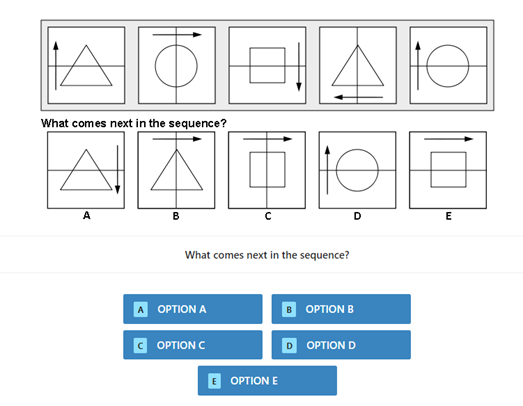
This question has been designed to assess a candidate’s logical reasoning ability using the information provided in a sequence of five diagrams containing various shapes.
When a candidate is approaching a logical reasoning question like the one above, they will have to think methodically. This question is a typical example of the logical reasoning assessment.
The task:
Average time per question: 60 seconds
The logical test typically contains 14-25 questions
Focusing on the top table of sequences, applicants must think logically about what comes next.
Logical test example 1 worked solution:
Answer: The correct option must be vertical meaning the answer is C
Example 2
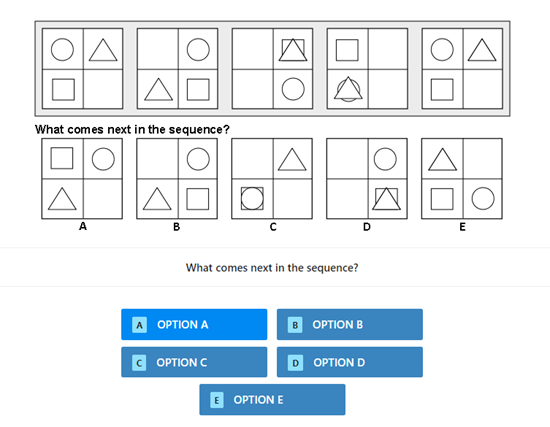
This logical reasoning question is another example of a common question candidates will face. This is similar to the first question because it is testing the shapes moving around the boxes.
Logical test example 2 worked solution:
Answer: Option B is the correct answer
Example 3
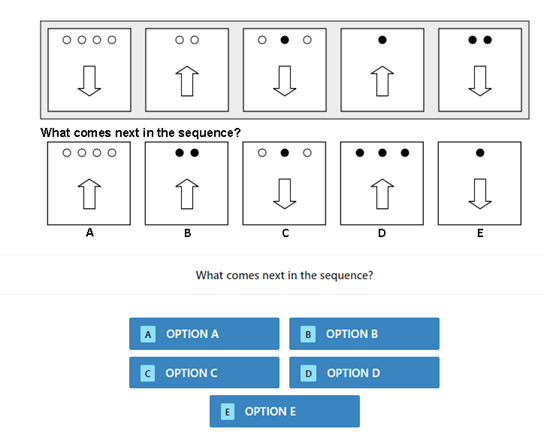
Question 3 is a bit different to the two above. It uses arrows and dots in a different format. The same applies, candidates must work out the answer relating to the rotation and colour of the dots and arrows.
Logical test example 3 worked solution:
Answer: B is the correct answer.
There are many different types of logical reasoning tests however it is important to note that these terms are sometimes used interchangeably, depending on who the assessment tests publisher is.
Understanding these tests will help you decide which is the best test for your organisation and navigate the sometimes very new world of psychometrics terminology.
Types of pre-employment logical reasoning tests:
You may be wondering now what the benefits of using logical reasoning tests in a recruitment process are. Let’s find out.

8 REASONS (PROS) TO USE LOGICAL REASONING ASSESSMENTS IN RECRUITMENT

5 POINTS (CONS) TO CONSIDER WHEN USING LOGICAL REASONING TESTS:
With more of an understanding on the benefits of logical reasoning tests in hiring and potential drawbacks, we will now go on to discuss when employers should use logical reasoning tests to recruit.

Logical reasoning tests can be used at your organisation to help make better hiring decisions and more accurately assess candidates’ capacity to perform the job. The ability to solve problems well is a worldwide skill. Thus, these tests can be used to help select candidates for multiple roles.
Logical tests are also broadly used in internal development programs to assess employees who are already in the job either for further development or promotion.
When logical reasoning tests are used in recruitment, you can expect the test to outline one aspect of the candidate’s core abilities, following the candidate’s success in the first stage of the application, which is typically online. By combining logical reasoning with a breadth of assessments assessing their personality, competence, and skills, this means that all qualities are measured with an equal weighting.
Logical tests help senior managers try to understand where there could be potential for candidates to succeed in roles and climb the corporate ladder. Other recruitment managers use the data insights gathered to help guide applicants through their role within the business.
Logical reasoning tests are frequently used during the application process for:
The multiple-choice logical reasoning questions are based on a given job function that might require logical reasoning. This gives an employer a realistic insight into how an applicant might perform in the role they are applying for.
These tests are suitable for graduate level recruitment right through to experienced and senior hires. The questions may be adopted accordingly to reflect increased job complexity.
The role that logical reasoning tests play however may differ. For example, certain roles have larger applications than others.
There are 2 forms of recruitment, and these can affect how logical reasoning tests are used:
a. Use of logical reasoning tests in HIGH volume recruitment (large number of applications):
Employers use logical reasoning tests in high volumes (dozens of thousands of tests per year per employer) for recruitment purposes. Logical reasoning tests have been designed to predict job performance and research has shown that those candidates who do well in these tests tend to perform better in the job. This predictive validity is why logical reasoning tests so commonly form a fundamental part of the application process globally.
For graduate and entry roles it is common to receive a large volume of applications. It is important for recruiters to sift through these applicants in a legally defensible way but with an efficient measure.
Using a psychometrically robust logical reasoning test allows you to reduce the candidate pool by 50% when partnered with another psychometric test such as numerical reasoning, or 30% if the logical reasoning test is used alone as an assessment tool.
Logical tests in high volume recruitment are typically used by organisations who launch specific graduate programs and need to select a number of candidates in a relatively short period of time to commence the programme. For instance, they offer 100 roles and receive 20,000 applications.
In volume recruitments it is important that the test provider ensures they can cope with a large volume of tests being completed in a short period of time.
b. Use of logical reasoning tests in rolling recruitment (low number of applications):
Employers may wish to review applicants as they arrive on a rolling basis. This could be for roles such as graduates, entry roles or more experienced managerial roles. Logical reasoning tests are a good method to sift candidates at this stage. When desiring to continuously grow and develop a team, it is important that employers have the right tools in place. This makes for a more smooth and effective process for candidates and employers.
Companies can carry out recruitment as a continuous process all throughout the year and have different deadlines for different roles. They simply fill vacancies as they become available. Appropriate candidates can be processed through this cycle, and employers can have increased confidence when taking people onto first-line interviewing stages, for example.
Some examples of companies that use rolling recruitment include Accenture, Deloitte, Dyson, IBM, KPMG, Aldi, Arcadia Group, Boots, Citi, Google, and McDonald’s, among others.
In rolling recruitments it is important that the test provider ensures a capability to run a process on a continuous basis, providing ongoing reporting, support to recruiters, proper communication and low admin effort on the recruiter side.
If you have questions about how to best design your assessment testing process, contact us and our experts will gladly help you.

Even after reading all above you may still have a question: Which roles should I consider using logical reasoning tests for? Where do I get most of the benefits described above?
There is no scientific answer to that question however, after spending many years working with multiple organisations and supported by research we will provide you with sufficient detail below for you to make a decision.
First, you may think of using numerical reasoning recruitment tests. These are typically the first choice and for a good reason the most popular (please see our full guide on pre-employment numerical tests here).
Secondly, you may not find numerical reasoning tests sufficient in finding applicants best suited to the role. There may not be enough differentiation and you may be looking for that logical aptitude among candidates.
For example, when targeting candidates for jobs such as IT experts, consultants and analysts you must consider the role that problem solving has in these jobs. As such you may choose to use logical reasoning tests to assess candidates instead of or as well as the numerical reasoning test, to identify if applicants have good problem-solving skills to help with day-to-day tasks. This will allow you to gain an overview into potentials for success in the role.
If you do not mind a slight increase in the length of your assessment process, we recommend using a logical test in conjunction with a numerical test.
Logical tests are often used in conjunction with numerical, rather than verbal reasoning tests as the roles they sift for often involve working with nonverbal information such as data analysis. Such roles require a greater understanding of a candidate’s ability to work numerically and form logical conclusions, and as such do not place emphasis on verbal reasoning at the assessment phase of the recruitment process.
In a business environment, most roles in a company will benefit from logical reasoning tests as a sifting tool since it is a fundamental skill in:

Industries that typically use logical reasoning tests in recruitment include:
Consulting and Accounting – logical tests are commonly used in the consulting industry for most entry jobs, internships, and more senior roles. Employers who utilise logical reasoning tests include the Big 4 (Deloitte, PwC, EY, KPMG), Accenture, strategic consultancies (Bain, McKinsey), and boutique consultancies. The candidates for the jobs in these companies have to possess very strong logical capabilities since often they face more senior employees as their customers, so speed of thinking, ability to come with a logical sequence of action, etc. is critical for their success.
Technology – logical reasoning tests are welcomed in technology roles. Some employers that implement logical reasoning tests into their application process are Samsung, Amazon, Apple, Microsoft.
Banking and Finance – logical reasoning tests are often used for banking and finance jobs. Most banks and financial institutions use logical reasoning tests and among them are Barclays, HSBC, Goldman Sachs, JP Morgan, Morgan Stanley, and Lloyds Banking Group.
Broadly speaking, the above are industries that have been successfully using logical recruitment tests for many, many years to select the best candidates. A proper selection of talent is what makes them successful in the long run.
However, the use of the tests is not industry specific but rather role specific. The most typical roles that benefit from the use of logical testing at hiring are:
For jobs that don’t require high levels of logical reasoning skills, literacy and numeracy tests are still often used for recruitment such as numerical reasoning tests and verbal reasoning tests to outline candidate’s skills and how they work through challenging tasks.
If you are an organisation that is unsure if using the logical tests is the right choice, get in touch with us and we will do a free-of-charge assessment of your needs.

Let’s face it. The candidates do not like to be tested. They however accept the reality that if you are looking to staff 10 positions and 5,000 people apply, there has to be a selection process and 5,000 people cannot be interviewed.
Improve candidate engagement by helping them understand how your organisation runs the hiring process, by providing them with advice on how they can best present their abilities will ensure that the tests reduce bias. Being open and transparent is key to helping manage candidate engagement.
Use of a logical reasoning test can improve perception and candidate experience of your recruitment process, leaving prospective employees with the feeling that you value taking the time to find the right talent whilst reducing bias and taking a professional approach to hiring. They understand that certain roles require certain abilities and the most objective method to measure logical skill in a large population are the tests.
As your recruitment process reflects directly on your company brand, it is important that it creates a good impression and receives positive feedback from applicants. Candidates will appreciate the objectivity that logical tests (and other aptitude tests) bring to the recruitment process.
Below are two key reasons why logical reasoning tests increase candidate experience:

Logical reasoning tests have been used for a long time by many organisations to assess a candidate’s ability. At Assess Candidates, we provide a range of assessments including the logical reasoning test to suit all organisation’s needs.
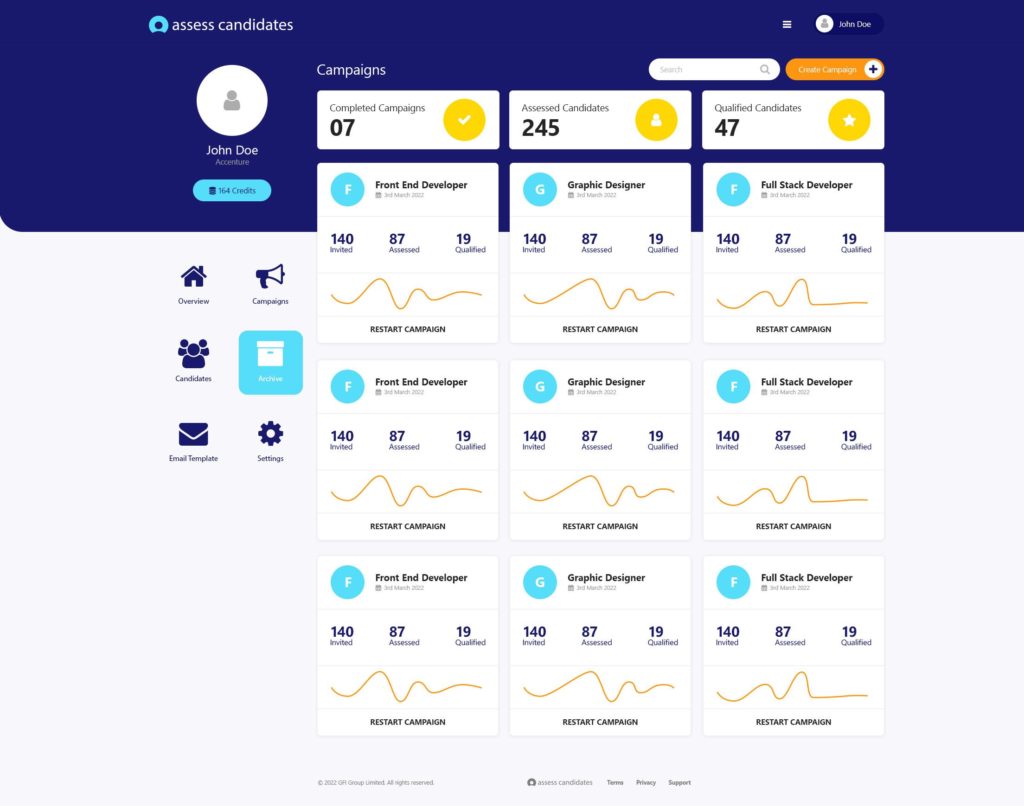
Above is an example of our reporting tool on Assess Candidates, that you as a hiring manager or talent acquisition expert will see when reviewing candidate performance.
Four reasons why to use Assess Candidates:
1. Experienced psychologists developing top industry tests
2. Best-in-class reports enabling to shortlist your candidates fast using flexible criteria
3. Engaging Candidate Experience
4. Candidate Accessibility Support
Are you assessing candidates’ suitability, in terms of both drive and core knowledge? Are you a talent acquisition specialist, maybe an experienced recruiter, HR expert or a hiring manager? Most probably you are already using some assessment tools to help you find and hire the best fit candidate, fast. These tools may include aptitude tests, video interviews, assessment centres or even game-based assessments.
If you are looking for answers to questions such as
Keep reading to find out how to use situational judgement tests to select candidates and recruit best fit talent.
This article will provide you with an informative, easy to read summary about one of the most widely used competency tests used in recruitment and candidate selection – pre-employment situational judgement test.
As a recruiter, you need to have a portfolio of tools that helps you select the best candidates, fast and without spending thousands of dollars, pounds, or euros.
Designing a properly functioning recruitment funnel helps a lot. The hiring funnel is the series of stages through which a candidate’s consideration for employment progresses.
This article unveils key aspects of the situational judgement tests and their use in hiring. You will learn what situational judgement tests are, pros and cons of using them, which roles would benefit the most from their use and why they are so popular.
Keep reading to find out more and if you have any questions, just contact us. With many years of experience, we, Assess Candidates, are a team of organisational psychologists and consultants who are here to help you set up the candidate assessment process and tests to recruit the best candidates for your organisation.
Contents:
Pre employment situational judgement tests are one of many psychometric tests commonly used in recruitment. They assess a person’s ability (competence) to choose the most appropriate action in a workplace situation based on a series of scenarios provided. Typically these tests can be job / competence specific (e.g. you may assess a candidate for a sales job using specific competencies required in sales).
Situational judgement tests can be standardised or produced on a bespoke basis for your organisation, and actual examples from the job role are used. As a result, these tests carry high face validity and individuals taking these assessments are likely to see the relevance of the test to the job they are being assessed for. They tend to be favoured by candidates as they get a feel for the job and deeper insight into the role.
Most often the interim solution is provided, i.e. a recruiter provides key criteria for a job (e.g. competencies) and the SJT is built from a bank of questions for that specific role considering the abilities sought after and to be tested.
If you need a test that informs you on whether a candidate’s behaviour fits with what is expected in your organisation, then the situational judgement test is right for your company.
Assess Candidates’ Situational Judgement Tests have been prepared by experts with many years of experience with top test developers (such as SHL and Kenexa) and are easily self-customizable for dozens of roles. Our team will give you all the help you may need to set up your bespoke SJTs if needed.
Situational judgement assessment tests are:
For recruiters and hiring managers, situational judgement tests form a fundamental part of the selection process supporting in finding those applicants that have the competence to fill the requirements of the role.
Keep reading to find out more about how you and your organisation can benefit from using pre-employment situational judgement tests.

In situational judgement tests, candidates are presented with a passage and asked to choose two answers out of 4, which is the best and which is the worst. As such, situational judgement tests allow a candidate to demonstrate their understanding of the best courses of action required per role relating to many different competencies. With a lenient time limit, candidates are not challenged by the clock, the focus is on their ability to cope with various realistic situations.
Situational judgement recruitment tests:
Let us now see how this process could work in your organisation.
When a recruiter or a human resources specialist invites pre-screened candidates to online situational judgement tests, the candidates have a dedicated period (usually several days) to complete the tests at home. The recruiter then reviews the results via an online report and selects the candidates to move to another round of the assessments.
There are a handful of companies on the market providing situational judgement tests solutions. Often, you may need to explore if a bespoke solution will be appropriate and cost-effective.
Off-the-shelf situational judgement tests will usually do the job. However, if you want a more personalised specific test related to your advertised role and company competency framework, this is also possible. Make sure they can prove that their tests have been created and validated by professional organisational psychologists and psychometricians. Otherwise, these tests will not deliver on selecting the right candidates.
Important. Often situational tests are used in conjunction with other psychometric tests so the decision to qualify a candidate to the next round may be based on combined results as well as on the type of role. If you would like to get a better understanding of how to use situational (and other) reasoning assessments, please contact us for free advice.

Situational judgement tests can help assess the skills and select candidates who possess critical skills necessary in today’s virtually remote world.
Recruiters often use SJT’s to assess a candidate’s ability to:
Situational judgement tests are usually used to assess a candidate’s ability to embody a specific competency.
Typically, there are many competencies which are amenable to all SJT’s, here are some examples:
The results of the situational judgement test will demonstrate an individual’s ability in different competencies and their strengths and areas for improvement. For example, if applying for a consultant role, the skills that a candidate must acquire are analytical skills, excellent interpersonal skills and teamworking skills.
Situational judgement tests help candidates to be aware of making important decisions in the workplace, identify different competencies needed and set achievable goals.
Further in the text you will find specific roles where the use of pre-employment situational tests in the job interview process is highly recommended.

To help you visualise the SJT questions used in candidate selection, here is an example of a pre-employment situational judgement test question with worked solutions:
Pre-Employment Situational Judgement Test Question Example
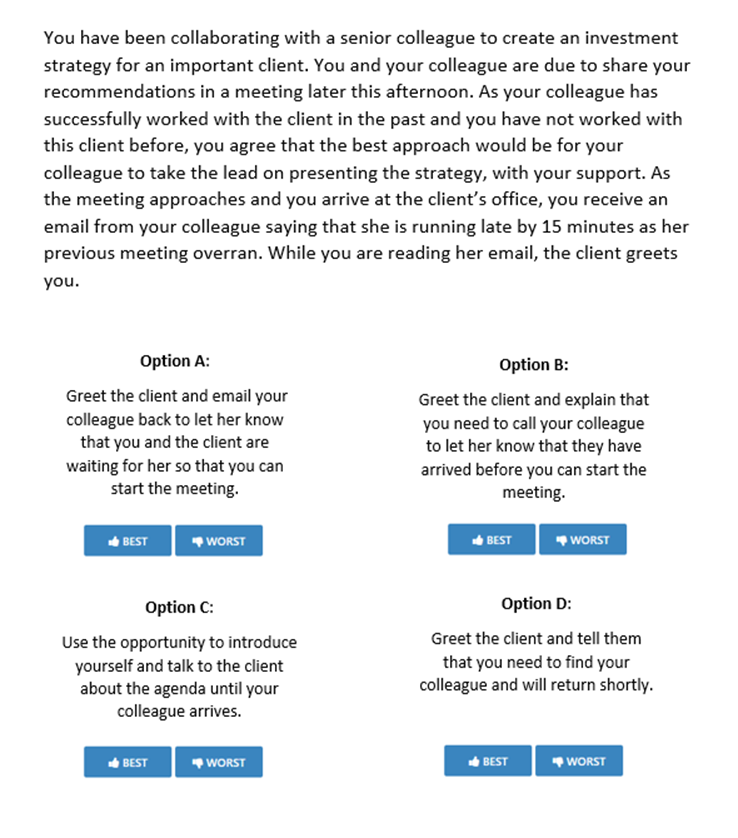
The task:
Note: the other two options are somewhere between the best and worst.
There is not usually a specific time limit per question. However, in our tests at Assess Candidates we provide an hour for the applicants to complete the test to ensure they submit all 18 questions.
Situational judgement recruitment test example worked solution:
The question above is an example of a candidate being assessed for a finance or a sales role.
Advantages and disadvantages of using situational judgement tests in candidate selection
Why should you consider using situational judgement tests in hiring?
With more of an understanding on the benefits of situational judgement tests in hiring and potential drawbacks, we will now go on to discuss when employers should use situational judgement tests to recruit.

Situational judgement tests are frequently used during the application process for various roles including finance, retail, and public professions. Below is an outline of the roles in which the situational judgement test may be used and how they apply to the given role.
Relevance of situational judgement tests in public professions:
| Public Professions Role | Role Description | How do situational judgement tests apply to this role? |
|---|---|---|
| Firefighters | Firefighters respond to emergency situations and protect people, the environment and property from all types of accident and emergencies. They work closely with the local community to increase the level of fire safety awareness, in order to help prevent fires and accidents happening. | The SJT will assess a future firefighter’s ability to choose workplace scenarios that ensure the safety of themselves and others and also the ability to make the correct decisions with limited information- creating a virtual situation that needs to be dealt with in the most appropriate and effective way. The SJT may outline problems with colleagues in dealing with the public, it will help employers ensure they have the correct skills needed for each aspect of the job. |
| Teachers | Teachers develop curriculum and lesson plans, and present those lessons to their students, individually or in groups. They track the progress of their students and create reports to inform parents about their progress. | SJT will assess a future teacher’s ability to answer scenarios based on colleagues, teamwork and communicating with children/students. It will assess their planning and organising ability to produce lessons and activities and their ability to deliver results in a timely manner, for example helping other teachers or students to obtain their targets. |
| Local Council | Administrators work for local councils on administrative, financial and human resources tasks. Administrators keep local councils running smoothly. They look after the information that council staff need to do their jobs – for example, details about customers, projects, finances and community facilities. | A SJT can test a candidate’s ability to deliver results. As a future administrator they must meet targets in a timely manner. They also must be customer centred to demonstrate empathy to customers and anticipate their needs. Furthermore, have good team work and be able to work with colleagues to achieve goals. |
Relevance of situational judgement tests in retail:
| Retail Role | Role Description | How do situational judgement tests apply to this role? |
|---|---|---|
| Department Managers | Department managers oversee the functioning and productivity of a company division. Their responsibilities include recruiting and dismissing staff, establishing, and working towards strategic departmental goals and managing a departmental budget. | Management positions require the ability to motivate a team and solve conflicts. An SJT will access their teamwork and communicating skills to be able to work with colleagues and lead them in their required role. |
| Retail Advisors | Sales advisors facilitate sales transactions by advising customers on suitable products that best meet their needs and encourage purchases. They explain product features and benefits to customers, assist them in locating specified products on the sales floor, and process customer payments. | An SJT will assess how customer-service orientated a candidate is. A good retail advisor must demonstrate empathy to customers and anticipate customer needs. Understand if the candidate will listen and ask questions to better understand their colleagues as well as customers. |
| Visual merchandisers | A Visual Merchandiser is responsible for planning and building displays that maximise impact on a day-to-day basis. They move equipment, arrange lighting and work with suppliers, while maintaining close connections at wider retail levels. | Situational judgement tests measure if visual merchandisers demonstrate good planning, organisational and decision-making skills when arranging stores. They also measure ability to cope under pressure when working with suppliers. |
Relevance of situational judgement tests in finance:
| Finance Role | Role Description | How do situational judgement tests apply to this role? |
|---|---|---|
| Finance Graduate Scheme | Entry Level Financial Analysts are responsible for consolidating and analysing budgets and income statement forecasts. They perform analysis of actual results at corporate and division levels. | SJT assesses an applicant’s ability to time manage when working with clients and performing analysis. SJTs measure whether a candidate excels in innovating as they must look for efficient measures from a cost perspective and deliver results. |
| Graduate Accountant | Graduates will be responsible for the upload of the monthly forecast and balance sheet reconciliations. Assist with the annual audit of the business unit legal entities and liaison with auditors throughout the audit process. Assist with tax accounting and liaise with appointed tax teams ensuring deadlines for local and foreign tax reporting are adhered to. | Graduate accountants assess a candidate’s ability to time manage when working with clients whilst performing balance sheets and audits. They should successfully be able to work with other members of the team and be good at communication when presenting information to clients. |
| Insurance, Reinsurance and Risk Management Graduate Programme | This role consists of graduates understanding the importance of claims through to winning new business. They’ll focus on developing client-management skills too, and building relationships with a broad spectrum of people — including clients, own industry specialists and members of the global reinsurance markets. | For this graduate programme, graduates should be customer centred to have client-management skills. As well as being able to inspire others and lead with creating and dealing with challenging tasks. Planning and organising would also be a good skill to move onwards and win new businesses. |
| Mortgage Advisor | Responsibilities as a mortgage advisor include meeting clients in person, or over the phone, assessing which type of mortgage is most suitable for each client, keeping up to date with new mortgage products and changes in mortgage regulation. | Mortgage advisors must show empathy and good communication to help customers and solve problems. They should have strong competencies in customer service skills as they deal with clients every day as well as working with colleagues. |
| Bank Cashier/Clerk | A Bank Cashier, or Bank Teller provides face-to-face services in banks and handles customers’ concerns and complaints. Their duties include greeting customers, opening, and closing accounts and handling deposits and withdrawals. | SJT measures skills such as time management relating to servicing clients and ensuring everything complies with the relevant standard. Candidates also need to demonstrate communicating skills for this role, customer care when speaking with customers and attention to detail. |
Relevance of situational judgement tests in consultancy:
| Consultancy Role | Role Description | What workstyle preferences apply to this role? |
|---|---|---|
| Trainee Consultant | A consultant trainee works to establish a knowledge base and expertise in the underlying industry and develop a client portfolio. They will research, field calls and questions and organise clients’ databases and consultants’ schedules. | Trainee consultants are generally organised and able to plan. They are people focused and able to interact with clients and work with others. |
| Consulting Graduate Programme | Consulting graduates will be thinking and innovating with colleagues across the firm to solve fascinating problems. They’ll define strategies, plan their development, and implement outcomes. And collaborate – with clients and colleagues. Graduates will imagine, deliver and run the future of their organisations, creating solutions. | Consulting graduates are normally good at communicating, influencing and persuading others with good ideas and working with others. This is because they must define strategies and plan development. They also are customer centred to deliver the best results for clients. |
| Management Consultant | Management consultants help organisations to solve issues, create value, maximise growth and improve business performance. They do so by using their business expertise and skills to provide objective advice and to help an organisation develop any specialist skills they may be lacking. | Management consultants are commonly empathetic to businesses and organisations when working with them. They tend to be confident when speaking to new and existing staff. Management consultants are usually between easy-going and conscientious, as they are adaptable to change in terms of movement of staff. |
| Recruitment Consultant | The main duties of a recruitment consultant include negotiating contracts, interviewing prospective applicants, and matching them with vacancies at client companies, screening candidates and drawing up shortlists of candidates for clients to interview. | Recruitment consultants are generally open and understanding when it comes to various peoples’ interests. Recruiters are also outgoing and find it comfortable meeting new people confidently. |

Most typically the pass mark used for assessing applicants with the SJT would not go above the 50th Percentile.
Situational judgement tests can be used at your organisation to help identify what an individual excels in, specifically in relation to certain competencies. Most importantly the test will accurately assess candidates’ capacity to perform the job. The ability to identify competencies such as leadership and communication is a worldwide skill. Thus, these tests can be used to help select candidates for multiple roles.
When situational tests are used in recruitment, you can expect the test to outline many aspects of the candidate’s core skills and emotional abilities, following the candidate’s success in the first stage of the application, which is typically online. By combining situational judgement with a breadth of assessments assessing their personality, it means that all qualities are measured with an equal weighting.
The situational judgement questions are based on a specific competency that might require candidates to outline their overall fit to the roll. It gives an employer a realistic insight into how an applicant might perform in the role they are applying for.
These tests are suitable for graduate level recruitment right through to experienced and senior hires. The questions may be adopted accordingly to reflect increased job complexity.
There are 4 forms of recruitment, and these can affect how situational judgement tests are used:
A question you may be asking yourself is, how will this test work when I have deadlines to meet? Luckily, situational judgement tests can be used as a high-volume recruiter (sometimes referred to as mass hiring) for a wide variety of candidates in a limited period. Here, there is no specific number to hold on to.
Situational judgement tests have been designed to predict job performance and research has shown that those candidates who do well in these tests tend to perform better in the job. This predictive validity is why situational judgement tests so commonly form a fundamental part of the application process globally.
For graduate and entry roles it is common to receive a large volume of applications. It is important for recruiters to sift through these applicants in a legally defensible way but with an efficient measure.
Using a psychometrically robust situational judgement test allows you to significantly reduce the candidate pool when partnered with another psychometric test, for example the personality test or a more technical one such as the numerical reasoning test.
Situational judgement tests in high volume recruitment are typically used by organisations who launch specific graduate programs and need to select a number of candidates in a relatively short period of time to commence the programme. For instance:
and many more.
In volume recruitments it is important that the test provider ensures they can cope with a large volume of tests being completed in a short period of time.
Often when recruiters are assessing candidates for consulting, finance or retail roles and they have a smaller business they may use the situational judgement tests to assist them with recruitment.
Medium volume of applicants means the focus moves away from the need to sift but more to identify skills. This is because if a role has a medium number of applicants it is more likely to be for a more highly skilled position or managerial role.
Be rest assured that at Assess Candidates you can personalise the tests to sift through them how you wish, as well as adding additional tests such as the video interview to personalise your own specific questions related to your company.
Often when assessing senior hires such as a financial director role, there will be a smaller volume of applicants. With a smaller volume of applicants, the focus shifts away from the need to sift but more to identify skills.
Situational Judgement tests allow employers to gain insights into fundamental ability in a cost-effective way, prior to advancing them to more expensive measures of their performance such as interviews or assessment exercises.
Employers may wish to review applicants as they arrive on a rolling basis. This could be for roles such as graduates, entry roles or more experienced managerial roles.
Situational judgement tests are a good method to evaluate candidate suitability at the stage after the traditional numerical and verbal tests. When desiring to continuously grow and develop a team, it is important that employers have the right tools in place. This makes for a more smooth and effective process for candidates and employers.
Companies can carry out recruitment as a continuous process all throughout the year and have different deadlines for different roles. They simply fill vacancies as they become available. Appropriate candidates can be processed through this cycle, and employers can have increased confidence when taking individuals onto first-line interviewing stages, for example.
Some examples of companies that use rolling recruitment include: KPMG, Aldi, Arcadia Group, Accenture, Deloitte, Dyson, IBM, Boots, Citi, Google, and McDonald’s, among others.
In rolling recruitments, it is important that the test provider ensures a capability to run a process on a continuous basis, providing ongoing reporting, support to recruiters, proper communication and low admin effort on the recruiter side. An applicant tracking system is often useful for achieving this.
If you have questions about how to best design your assessment testing process, contact us and our experts will gladly help you.

Even after reading all above, you may still have questions: Which roles should I consider when using the situational judgement test? Which benefits help me in regard to the role I am recruiting for?
There is no scientific answer to that question however, after spending many years working with multiple organisations and supported by research we will provide you with sufficient details below for you to decide.
First, you may think of using numerical reasoning pre-employment tests. These are typically the first choice and for a good reason the most popular (please see our full guide on pre-employment numerical tests here).
Secondly, you may not find numerical reasoning tests sufficient in finding applicants best suited to the role. You might feel that there is not enough differentiation between candidates with this alone and you may be looking for a test to identify a candidate’s competencies and emotional intelligence.
For example, when targeting candidates for jobs such as medical practitioners, finance managers and customer service roles you must consider the relation that different competencies have in these jobs. As such you may choose to use situational judgement tests to assess candidates instead of or as well as the numerical reasoning test. This will help you to identify if applicants have, for example, good problem-solving skills or a good independent working style when working through day-to-day tasks. This will allow you to gain an overview into potentials for success in the role.
Situational judgement tests are not typically used on their own. If you do not mind a slight increase in the length of your assessment process, we recommend using a situational test in conjunction with a personality test. This step in the recruitment process is usually after doing a traditional psychometric assessment such as the numerical, verbal, or logical test.
Industries that typically use situational judgement tests in recruitment include:
Broadly speaking, the above are industries that have been successfully using situational judgement pre-employment tests to select the best candidates. A proper selection of talent is what makes them successful in the long run.
For jobs that don’t require high levels of situational judgement tests, literacy and numeracy tests are still often used for recruitment such as numerical reasoning tests and verbal reasoning tests to outline candidate’s skills and how they work through challenging tasks.
If you are an organisation that is unsure if using the situational judgement tests is the right choice, get in touch with us and we will do a free-of-charge assessment of your needs.
You may be thinking why are situational judgement tests so commonly used? SJT’s can be used for any type of role whether that be working with people, working in an office setting, working with decisions or any manner of situations. Situational judgement tests can be crafted around the specifics outlined in job descriptions. They can also be used and tailored for a specific company using competency frameworks. 3 reasons why situational judgement tests are so popular include:

At Assess Candidates we provide a range of assessments including situational judgement tests to suit all organisation’s needs.
We offer both, self-customizable and fully-fledged bespoke SJTs:
Self-customizable SJTs:
The advantages: no extra cost, rapid as the test is available immediately
Fully-fledged, bespoke SJT:
If you do not have typical roles for senior positions or need for internal development, we will create bespoke SJTs after gathering your individual needs. Simply contact one of our experts.
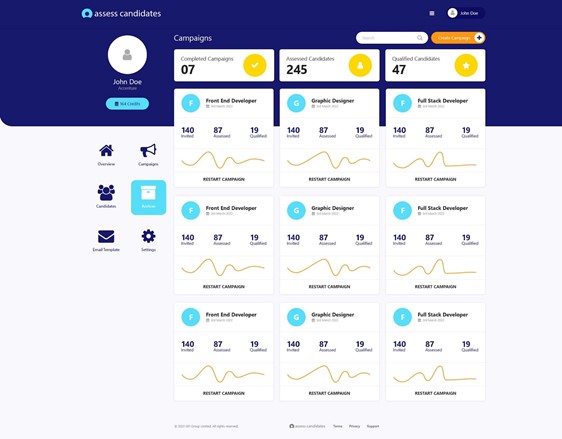
Above is an example of our reporting tool on Assess Candidates, that you as a hiring manager or talent acquisition expert will see when reviewing candidate performance.
1. Experienced psychologists developing top industry tests
2. Top in class reports enabling to shortlist your candidates fast using flexible criteria
3. Engaging Candidate Experience
4. Candidate Accessibility Support
It is a scientifically proven fact that personality at work plays a vital role in how employees perform, interact with others, and are satisfied with their job. As an employer looking for the best fit candidate to a specific position or job setting, requesting a candidate to complete a work style personality questionnaire is highly recommended.
Would you like insight into assessing a candidate’s personality, preferences, and drive? As an experienced recruiter or talent acquisition specialist, you may have already used some assessment tools to help you find and hire the best fit candidate, fast. These tools may include aptitude tests, video interviews, assessment centres or even assessment games.
You may be wondering:
As a recruiter, you need to have a portfolio of tools that helps you select the best candidates, fast and without spending thousands of dollars, pounds, or euros.
This article will provide you with an easy-to-read summary about one of the most widely used competency tests used in recruitment and candidate selection – pre-employment personality tests.
This article unveils key aspects of the personality questionnaire and its use in hiring. You will learn what they are, pros and cons of using them, which roles would benefit the most from their use and why they are so popular.
Keep reading to find out more and if you have any questions, just contact us. We, Assess Candidates, are a team of organisational psychologists and consultants and are here to help you.
Work-style personality questionnaire also referred to as work personality questionnaire.
A personality questionnaire (a.k.a. assessment) is designed to measure a candidate’s personality traits and behavioural preferences which are aligned with your company’s workplace.
Like most valid and established questionnaires, the work personality questionnaire (WPQ) is underpinned by the widely accepted areas of personality – The Big 5.
The Five-Factor Theory of Personality was developed by Costa and McCrae in 1986, they proposed 5 main personality traits producing the acronym OCEAN:
As a talent acquisition expert, you may want to get an insight on an applicant’s personality and skills a candidate pursues before meeting them for an interview. If you want a test that informs you on whether a candidate’s personality fits with what is expected in your organisation, then the pre-employment personality test is right for your company.
Work personality questionnaires are:
A personality test reveals core aspects of an applicant’s personality- their values, work preferences, their style, the bright side, and the dark side. Also, it reveals a candidate’s fitment in the company’s culture. Is the candidate possessing the required personality traits suitable for your job role?
We want to assure you as a recruiter or hiring manager about the details of the personality assessment for selection and give you any insights that you may be confused about relating to this specific test. The WPQ forms a fundamental part of the selection process supporting in finding those applicants who have the workplace strengths that you are looking for.
Keep reading to find out more about how you and your organisation can benefit from using pre-employment work-style personality questionnaires.

In work personality tests, candidates are presented with statements and are required to agree or disagree with them. As such the pre-employment personality test allow a candidate to demonstrate their comprehensive insight into the suitability of a role. With a lenient time limit, candidates are not challenged by the clock, the focus is on their level of agreeance on workplace preference statements.
Personality tests for recruitment:
Let us now see how this process could work in your organisation.
A recruiter’s process to find candidates is usually:
Many different companies are providing personality tests for recruitment. Often, you may need to explore if a bespoke solution will be appropriate and cost-effective. Off-the-shelf WPQ will usually do the job. Make sure they can prove that their tests have been created and validated by professional organisational psychologists and psychometricians. If not, these tests will not deliver on selecting the right candidates.
Important. Often personality tests in hiring are used in conjunction with other psychometric tests so the decision to qualify a candidate to the next round may be based on combined results as well as on the type of role. If you would like to get a better understanding of how to use pre-employment personality tests (and other) reasoning assessments, please contact us for free advice.

You may be thinking, why are personality tests key in a working environment?
Personality tests for recruitment are particularly popular in a wide range of industries. The test is important for jobs that require employers to understand whether a candidate will be energised in a work environment. For example, will the candidate thrive working with people, show their creative side, and be punctual in meeting strict deadlines. This understanding further leads to a happier and more profitable business.
A work style questionnaire can help you in a variety of ways:
Recruitment can be tough, but finding capable candidates is an important aspect of creating a profitable business. Pre-employment personality assessments are an easy and efficient way for hiring professionals to bring top-tier talent to the organisation.
These tests are suitable for graduate level recruitment right through to experienced and senior hires.
Broadly speaking, there are 2 recruitment volumes that lend themselves well to using personality assessments for selection:
Depending on which one is ongoing in your organisation this can affect personality tests for recruitment.
Recruiters and employers may use personality questionnaires for high volume recruitment, this could be hundreds or even thousands of candidates per year per job offer.
For graduate, entry roles it is common to receive a large volume of applications.
Before you take a candidate to a later interview stage, you can get an indicator of the type of person they are. The candidate may not be aligned to the preferences best suited to your role. In which case, it would be a benefit to the candidate and employer to not progress the application further. Alternatively, the candidate may be a good match in which case you can learn more when taking them through to the next stage.
Personality tests in high volume recruitment are typically used with other psychometric tests such as competency based situational judgement test, verbal or numerical to help sift out candidates. The numerical reasoning test would be used to sift applicants whereas the WPQ would help by giving you more insight into the candidate’s personality.
Organisations who launch specific graduate programmes need to select a number of candidates in a relatively short period of time to commence the programme. For instance, they may offer 100 roles and receive 20,000 applications.
Often when recruiters are assessing candidates for consulting, technology or public sector roles and they have a smaller business they may use the personality assessments to assist them with recruitment.
If you are part of a smaller company or organisation and want employees who are happy and want to stay for a longer tenure in your team, you need to be sure that you recognise their individuality from the start of the application process. One potential risk of using ability tests in isolation is that you ignore their workstyle preferences and the things that make them energised in the workspace.
We, at Assess Candidates, offer end-to-end set of candidate assessment tools that cater for a wide variety of roles you may wish to recruit for: ability tests (numerical, verbal, logical), situational, personality, game assessments (to complement traditional tests and increase candidates’ experience), video interviews with questions of your choice, assessment centre exercises. All this is delivered through an easy to manage online platform.
Further in the text you will find how candidates should approach the WPQ and which roles it applies to.

Personality tests for hiring are becoming much more common in today’s virtually remote world. Employers often use WPQ’s to access a candidate’s ability to:
Candidates aren’t required to have any skills to complete this test. It is essential that candidates answer honestly to ensure you can find the best fit for your company in relation to their answers.
The WPQ will demonstrate an individual’s preference in 5 dimensions of personality based on the responses that an applicant gives. These are:
There is also a 6th dimension that is assessed through any good personality questionnaire is the social desirability scale. The Social Desirability scale examines whether an applicant has responded in a socially desirable way to the questionnaire.
Candidates can sometimes be inclined to respond to the questionnaire in a way that makes them look good, rather than to respond in an accurate and truthful manner. The social desirability scale identifies whether the candidate is honest during the assessment. On a scale of 1 to 10, most people will land in the middle range (4,5,6,7), but both high and low scores must be reviewed with care. It is best to explore this with the candidate in a direct conversation, to see if you can offer any additional support.
A process you could follow when using the personality questionnaire would be:
Even if there are some areas of concern with the applicants not aligning to your organisation, they may still succeed. For example, if your role is more suitable for an introvert, someone who is an extrovert may still fit well into your organisation.
Personality tests for recruitment offer invaluable insights on candidates, providing objective and scientifically valid explanations of an individual’s thinking style, behaviour tendencies, values, and motivations. They can also be useful to better understand existing employees who are being considered for a different role, or as part of an ongoing internal development programme.
In the next section we have added an image of the WPQ to give you a visual representation of what the work-style personality test will look like when candidates are completing it.

To help you visualise the questions, here is an example of pre-employment workstyle personality test statements.
Example 1:
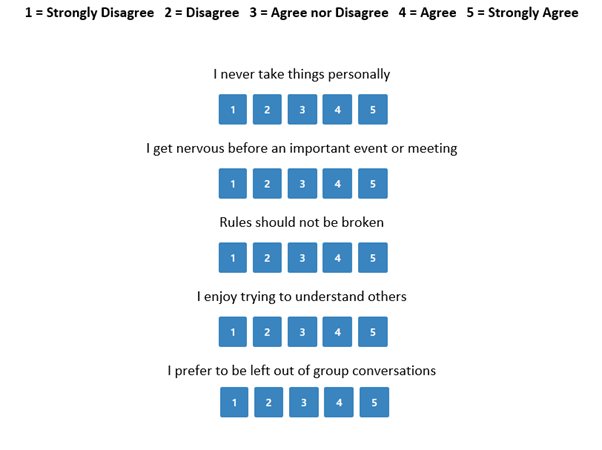
The task: Candidates must look at the statements carefully and identify the extent to which they agree with the statement, using the following 1 to 5 Likert scale:
Average time per question: 3-7 seconds
The WPQ typically contains 50-150 questions
There is no correct solution for questions in a WPQ, candidates must answer honestly based on their personality preferences.
You may be wondering now what the benefits of using pre-employment personality tests in a recruitment process are. Let’s find out.

With more of an understanding of how Assess Candidate’s personality tests can benefit your business, below is an outline of what employers should consider when using personality tests for recruitment.
With more of an understanding on the benefits and considerations of the personality questionnaires in hiring and potential drawbacks, we will now go on to discuss when employers should use personality tests for recruitment.

Personality tests for recruitment are frequently used during the application process for various roles including technology, consultancy, and the public sector. Below is an outline of the roles in which the personality tests may be used and how it applies to the given role.
Relevance of pre-employment personality tests in information technology:
| Information Technology Role | Role Description | What workstyle preferences apply to this role? |
|---|---|---|
| Technical support | Technical support team members monitor and maintain the technology of the workplace. They respond to requests to help the users in the business. Technical support provides you with the opportunity to work in different types of companies and the chance to explore different industries. | People focus applies to technical support staff as they enjoy working/helping others as well as being relationship focused and empathetic to deal with customer problems. They are usually more extraverted. Preferences for technical support staff also include being sociable and comfortable talking to new people, for example the customers. |
| Business analyst | Working as a business analyst is all about looking for ways to improve the processes and business operations using technology. You will be required to analyse business needs, gather requirements, and create a project plan to design technological solutions. | Business analysts are open, to improve processes and creative and innovative. They also tend to be easy going, adaptable to change and flexible. |
| Software engineer | As a software engineer you will be required to design and program system software. This requires the understanding of software and hardware functions. The role provides a lot of interaction with other areas of the business to assess and provide solutions. | Software engineers are people focused to understand the external demand of customers as well as being conscientious. They tend to be organised to make deadlines for new software and enjoy high attention to detail. |
Relevance of pre-employment personality tests in consultancy:
| Consultancy Role | Role Description | What workstyle preferences apply to this role? |
|---|---|---|
| Trainee Consultant | A consultant trainee works to establish a knowledge base and expertise in the underlying industry and develop a client portfolio. They will research, field calls and questions and organise clients’ databases and consultants’ schedules. | Trainee consultants are generally organised and able to plan. They are people focused and able to interact with clients and work with others. |
| Management Consultant | Management consultants help organisations to solve issues, create value, maximise growth and improve business performance. They do so by using their business expertise and skills to provide objective advice and to help an organisation develop any specialist skills they may be lacking. | Management consultants are commonly empathetic to businesses and organisations when working with them. They tend to be confident when speaking to new and existing staff. Management consultants are usually between easy-going and conscientious, as they are adaptable to change in terms of movement of staff. |
| Recruitment Consultant | The main duties of a recruitment consultant include negotiating contracts, interviewing prospective applicants, and matching them with vacancies at client companies, screening candidates and drawing up shortlists of candidates for clients to interview. | Recruitment consultants are generally open and understanding when it comes to various peoples’ interests. Recruiters are also outgoing and find it comfortable meeting new people confidently. |
Relevance of pre-employment personality tests in the public sector:
| Public Sector Role | Role Description | What workstyle preferences apply to this role? |
|---|---|---|
| Social workers | Social workers work with people to find solutions to their problems. This may be helping to protect vulnerable people from harm or abuse or supporting people to live independently. They work with clients, families, and others around them and with different client groups including: the elderly. | A social worker’s main job is communicating with vulnerable individuals and clients/families. That means they tend to be open, have good communication and listening skills. They also need to be target driven as they will have many appointments to attend. Social workers are often people focused. For example, they need to have a preference prioritising another person’s feelings over their own. |
| Planning officers | Planning officers generally work for local planning authorities, involved in development management associated with the local town planning system. They may also work in other public sector organisations. They must have a good knowledge of the local community, legislation, environmental issues, and social responsibilities. | Planning officers need to be able to plan local work and organise the correct people for jobs. They often have a good ability to work with others and be target driven. As well as this, planning officers tend to be comfortable speaking to different authorities. |
| Environmental health officers | Environmental health officers are responsible for monitoring and enforcing health and hygiene legislation. They also investigate when there’s an incident, such as pollution, a noise problem, toxic contamination, pest infestation or an outbreak of food poisoning. | Environmental health officers are sociable and find it easy when working with others as they are often people focused when having to deal with different aspects of the environment. Also, comfortable in their own company to work on their own if needed. They are commonly independent, target driven as well as optimistic. |

Personality assessments for selection help businesses ensure candidates have the required skill set to meet role requirements when applying for jobs.
When targeting candidates for jobs such as planning officers, trainee consultants and software engineers, you must consider the candidate’s personality to figure out whether they would be a good fit for the job. As such you may choose to use a personality questionnaire to assess candidates as well as the numerical reasoning test or potentially the verbal reasoning test. This will help you to identify if applicants have, for example, strong people skills or a good independent working style when working through day-to-day tasks. This will allow you to gain an overview into potentials for success in the role.
Pre-employment personality questionnaires are not typically used on their own. If you do not mind a slight increase in the length of your assessment process, we recommend using a personality test in conjunction with a situational judgement test or a traditional psychometric test such as numerical, verbal, or logical.
Industries that typically use personality tests in recruitment include:
Broadly speaking, the above are industries that have been successfully using personality pre-employment tests to select the best candidates. A proper selection of talent is what makes them successful in the long run.

The OPQ is a trait-based personality questionnaire which measures an individual’s personality preferences in the workplace. The results are interpreted in line with a role’s key behavioural expectations to see how well someone is suited to a job.
The SHL occupational personality questionnaire involves an aspect of the social desirability scale as well as the consistency scale. The consistency scale identifies whether a candidate is trying to distort the questionnaire, a low result can usually mean an individual has tried to portray themselves in a more desirable way or they did not understand the questions.
One key difference is, SHL’s OPQ primarily focuses on three key areas from a total of 32 dimensions relating to The Big Five and uses this to draw inferences on behavioural competence and job fit. The three key areas for SHL are:
Whereas, as mentioned above, Access Candidates WPQ, is designed to specifically look at the 5 continuums of the Big 5 to assess job fit.
There are three different versions of the OPQ that are currently in use today:
As you may have already noticed, the key second difference is that all the OPQ’s are longer than Access Candidates personality questionnaires.
The length of the Work Personality Questionnaire is designed to balance candidate experience and the ability to determine candidate preference.
In the final section, it will be outlined why you should use the Assess Candidates personality test.

Pre-employment personality tests have been used for a long time by many organisations to assess a candidate’s ability. At Assess Candidates we provide a range of assessments including personality questionnaires to suit all organisation’s needs.
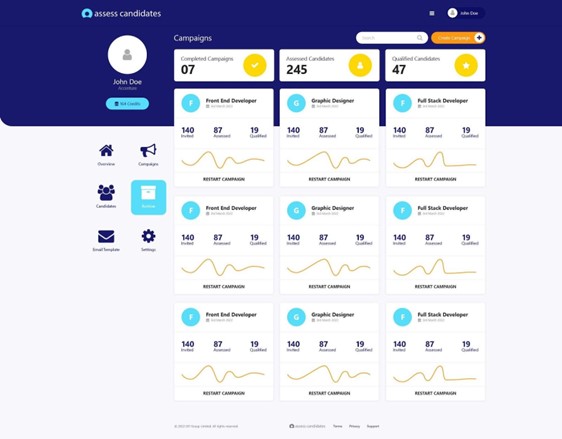
Above is an example of our reporting tool on Assess Candidates, that you as a hiring manager or talent acquisition expert will see when reviewing candidate performance.
1. Experienced psychologists developing top industry tests
2. Top in class reports enabling to shortlist your candidates fast using flexible criteria
3. Engaging Candidate Experience
4. Candidate Accessibility Support
In today’s rapidly-evolving job market, identifying and hiring top talent is crucial for organizations that are striving to build high-performing teams. As remote work (and virtual hiring) continue to gain traction, companies need to seek digital solutions to streamline their recruitment processes without sacrificing the quality of the hire.
In this article, we will explore the benefits of using pre-employment video interviews as a modern approach to recruitment. From reducing hiring costs and time-to-hire to providing deeper insight into candidates’ communication and interpersonal skills, video interviews offer a compelling alternative to conventional recruitment methods. Video interviews are a vital tool for organizations seeking to make informed hiring decisions and build exceptional teams.
We will delve into the ins and outs of video interviewing, including how it differs from traditional in-person interviews, its benefits and limitations, and how it can be effectively integrated into the hiring process. We will also provide real-world examples of how companies have successfully used video interviews to identify and hire top talent.
Contents
Video interviews in recruitment refer to the process of conducting job interviews with candidates using video technology. This method of interview has gained popularity in recent years due to:
Instead of conducting interviews in person, employers and hiring managers can connect with candidates virtually, regardless of their location.
Gartner report that 86% of organizations were using video interviews for recruitment by 2020. This suggests that organizations are finding video interviews to be an effective and efficient way to assess candidates remotely.
The high adoption rate of video interviewing indicates that it has become an accepted norm in the hiring process and is here to stay.
Let’s now take a look at the key video interview types that are currently used.
The two main types of video interviews are called asynchronous and synchronous interviews.
What is the difference between Automated Video Interviewing (Pre-recorded/One-Way) and Live Video Interviewing?
Asynchronous interviews, also known as one-way video interviews for hiring, are a type of job interview that allow candidates to record their responses to predetermined time limits and selected interview questions at their own convenience. These interviews are typically conducted in the early stages of the hiring process before the candidate meets the hiring team in person.
Synchronous or live video interviewing, on the other hand, allows for more personal interaction between the interviewer and candidate, and can give the interviewer a better sense of the candidate’s communication skills and personality. It can also be easier to build rapport with a candidate during a live video interview. However, live video interviewing can be more challenging to schedule, and can be affected by technical issues or interruptions.
| Automated video interviewing (asynchronous) | One-way video interviews where candidates record answers to pre-recorded questions. |
| Live video interviewing (synchronous) | A real-time conversation between the interviewer and candidate. |
In summary, video interviews have become an increasingly popular tool for recruiters and hiring managers to screen candidates, save time and streamline their recruitment process. Whether automated or live, video interviewing can offer benefits such as greater flexibility, reduced costs, and improved efficiency.
But, just how do they differ from the traditional method? Check out our graphic below for some key points.
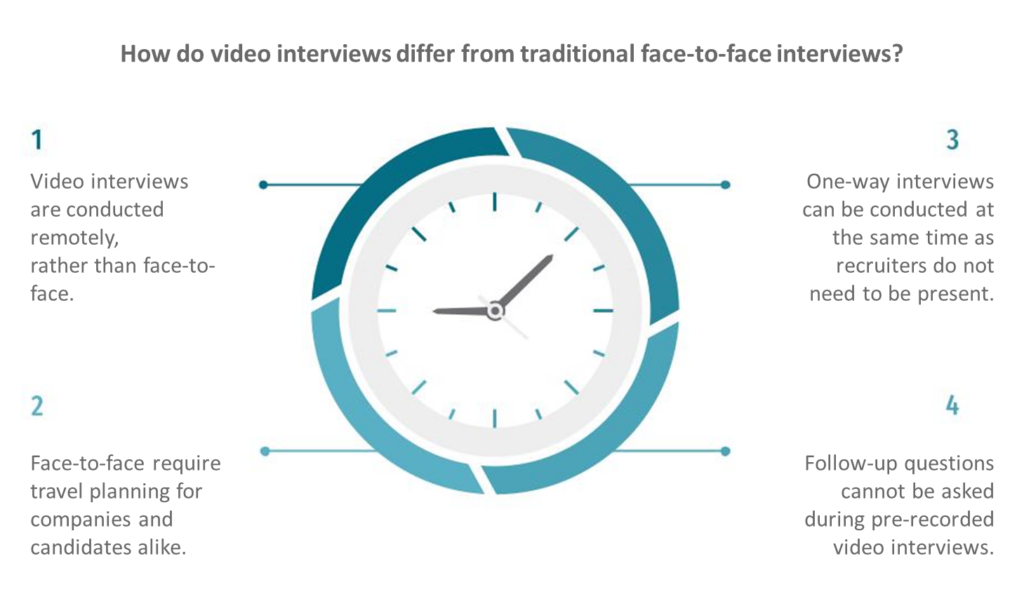
Did you know? A Totaljobs.com survey found that on average, graduates are willing to travel only 35 miles to meet a prospective employer. This highlights the benefit of video interviews, which allow candidates and employers to connect without the need for travel.
It’s clear video interviews are here to stay. We will now move onto how these are being leveraged by employers as part of their hiring processes.
Interview candidates with our automated recording software. Fast. Hire For Free
Employers use one-way and pre-recorded interviews differently in light of their format. Let’s break down how each of these are used starting with one-way or asynchronous interviews.
Prior to both asynchronous and synchronous video interviews, the hiring team must select a reliable video interviewing platform that is user friendly and easy to navigate for both them and the interviewee.
Questions should target the skills required for the role. These are often competency-based, such as, ‘give me an example of a time you demonstrated leadership’.
You need to ensure that clear instructions on how to complete the interview are provided and enough time has been allocated for the candidate to record their responses to each question.
Two-way or synchronous interviews differ in that they offer both the hiring team and the candidate to ask follow-up questions during the interview. Naturally, with the interview being live, questions are also more tailored to the candidate. Here’s how live interviews work.
Typically, multiple assessors are present at interview for more senior roles as part of a panel interview.
When selecting questions to ask a candidate, consider questions that tap into their background specifically and the job requirements. You want to ensure the individuality of the candidate is celebrated but also ensure you are able to gather the information you need to make an informed decision. Open-ended questions are great too, as they allow the candidate to elaborate on their skills and experience.
This can be a great way to tap into the detail you need. For example, say a candidate was giving an example of how they were a team player and mention someone they disagreed with in their project. You may deliberately follow-up with a question on conflict resolution to see if they would handle this in line with your organizational culture.
When reviewing the candidate’s responses, pay attention to their communication skills, their ability to answer the question comprehensively and concisely, and their overall professionalism.
Having covered how video interviews are used in hiring, we will now cover which organizations are leveraging this technology.
Video interviews have become a popular tool in the recruitment process for a variety of organizations across different industries. Many companies have incorporated video interviews into their talent acquisition strategies to streamline the hiring process, reduce costs, increase efficiency and candidate experience.
Notably, a 40% surge has been observed in the utilization of online testing platforms by employers, further solidifying the trend towards modern and technology-driven recruitment methods.
Organizations of all sizes, from startups to large multinational corporations, can benefit from using video interviews in their recruitment process. Companies in the industries below are just a few examples of those who have embraced video interviews as a valuable addition to their hiring practices:
Effective incorporation of video interviews into an organization’s talent acquisition strategy requires careful planning and execution:

If your organization is uncertain about the suitability of incorporating video interviews into your recruitment process, feel free to reach out to us. We offer a free-of-charge assessment of your requirements, allowing you to make an informed decision based on expert recommendations.
Let’s now move onto skills video interviews help to assess when screening candidates.
Video interviews are becoming increasingly popular among recruiters and hiring managers as a way to assess candidates‘ skills and suitability for a job. They offer an opportunity to evaluate candidates’ communication skills, body language, and non-verbal cues in a more convenient and cost-effective way than traditional face-to-face interviews. Here are some of the skills that can be assessed in candidates through video interviews:
The following steps can help ensure that video interviews are aligned with hiring goals and job requirements:
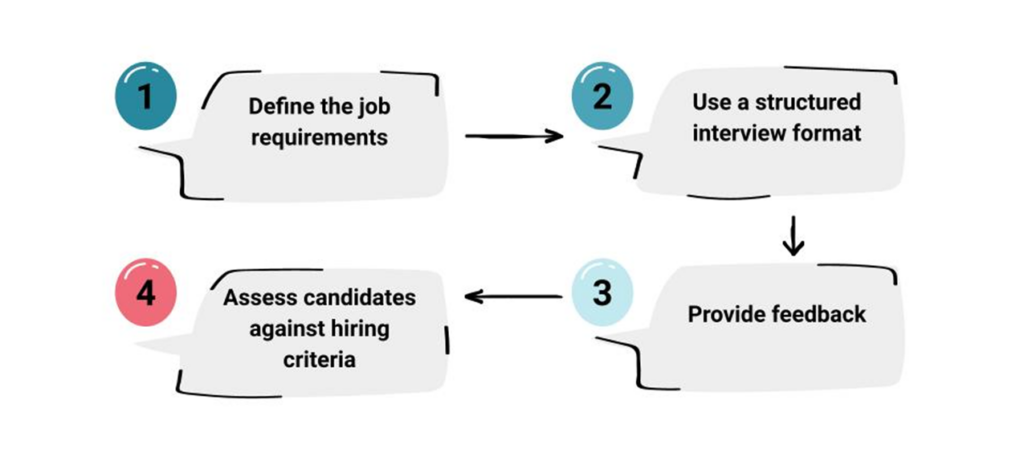
The process for two-way or live interviews is largely the same, however as we covered above, these will also include the added step of creating questions unique to each candidate. This ensures a more personal feel to the interview whilst the skills being looked for are assessed.
We will now cover why you should consider using video interviewing as part of your organization’ recruitment process.
Screen your candidates in minutes. Try a video interview today. Hire For Free
TOP 7 REASONS (PROS) TO USE VIDEO INTERVIEWS IN RECRUITMENT
| Benefit of video interview | How video interviews help with this | Who does this benefit? |
|---|---|---|
| Cost and time savings | Video interviews reduce costs associated with in-person interviews, such as travel expenses and meeting room rentals. This can save time for both the candidate and the interviewer. | Company and candidate |
| Ability to involve multiple assessors | Interview recordings can be shared within the organization for appraisal from multiple assessors. Multiple stakeholders accessing the recordings will support in taking an informed, balanced and unbiased decision. | Company |
| Help with sifting | Video interviews can be used at an early stage to help screen candidates. | Company |
| Standardized and legally defensible | Pre-recorded video interviews can provide a more objective evaluation of candidates, as each candidate is evaluated on the same set of questions and can be compared directly with other candidates. Recordings can evidence why a candidate was selected or not selected for the next stage. | Company |
| Improved candidate experience | There is no need to coordinate schedules between the interviewer and the candidate. Interviewers can review the responses at their convenience, whilst candidates can feel calmer and record responses at a comfortable and convenient time for them. | Company and candidate |
| Expands geographical pool of candidates and provides flexibility | Expands the talent pool and allows remote candidates from around the world to broaden their employment opportunities. | Company and candidate |
| Predict future performance | Video interviews have a proven record of predicting high performance in employees. To achieve this, make sure professionals validate the tests according to industry standards. | Company |
According to a survey conducted in 2014, more than 65% of candidates expressed a preference for video interviews during the hiring process
So, are virtual interviews just as effective as face-to-face interviews? Yes and no. Pre-recorded video interviews offer several advantages over traditional face-to-face interviews, such as saving time and resources, as they eliminate the need for scheduling and coordinating interviews with multiple stakeholders. Video Interviews also provide a more objective evaluation of candidates, as each candidate is evaluated on the same set of questions and can be compared directly with other candidates.
Let’s now move onto the drawbacks of video interviewing technology and how these can be mitigated for your talent acquisition process.
| Con of video interview | How video interviews may result in this | How to mitigate the impact on your process |
|---|---|---|
| Video interviews are more impersonal than face-to-face interviews | Pre-recorded video interviews can be perceived as impersonal or robotic, which can make it difficult for candidates to form a connection with the hiring team. As a company, you also miss out on valuable non-verbal communication, often vital supplementary cues, to support your decision-making. | Provide feedback to the candidate after the interview, thanking them for their time and highlighting what impressed you about their application. Additionally, you may opt for a live interview rather than one-way/prerecorded for a more personal conversation. |
| Speaking to a webcam can be anxiety-inducing | Many job seekers fail to attempt the video interview because of anxiety and the lack of first-hand experience. This may lose you potential candidates in the search for top talent. | Encourage candidates to practice beforehand, so they will feel more at ease when tackling the assessment. This will ensure they present their true ability under typical working conditions. |
| Technical issues can affect candidate experience and cost time | Video interviews can be subject to technical difficulties, such as poor video or audio quality, which can impact the evaluation process. Additionally, candidates must be reset if they have launched an assessment by mistake which can cost companies added admin time. | Ensure you have clear instructions on how to use the video interviewing software to ensure candidates have tested their camera and microphone. Additionally, make sure they are using the right browser. |
| No opportunity for questions from the interviewer or interviewee | Asking follow-up questions is a key ingredient to the interview process, allowing the interviewer and interviewee the opportunity to gather all the information they need. | Introduce an automated email after the process to allow candidates the opportunity to ask you any questions. Alternatively, reach out with follow-up questions once you have reviewed their recordings and encourage them to do the same. |
| Candidates miss out on exposure to your company culture | Getting a feel of a company’s culture through an office meet and greet is beneficial to both candidates and companies to ensure a good fit. | Include a welcome video to introduce your company and offices to candidates at the start of the process. You can also invite shortlisted candidates to an assessment center. These are a key stage for most recruitment processes and can be a good final step to see if a company and candidate align. |
| Lack of stable internet connections in some areas can cost you applicants | Video interviews require a more stable internet connection versus other online assessments. You may not receive submissions from some candidates in light of this, lightening your talent pool. | Allow an audio-only interview for regions where it may be more difficult to secure a more stable internet connection. Alternatively, use a one-way interview as these are easier to run versus live interviews that require a greater internet connection. |

Now that we have a balanced approach to the pros and cons of video interviewing, we will cover when this should be used in your hiring process.
Pre-employment video interviews can be a valuable tool in the hiring process, but they are not appropriate for every role or situation.
Here are 6 factors to consider when deciding whether to use video interviews in your hiring process:
Video interviews can be used for any role. Below is an outline of examples of roles in which video interviews may be used and one-way or two-way interview questions that may be asked.
| Retail Role | Role Description | What video interview questions apply to this role? |
|---|---|---|
| Department Managers | Department managers oversee the functioning and productivity of a company division. Their responsibilities include recruiting and dismissing staff, establishing, and working towards strategic departmental goals and managing a departmental budget. | – How would you handle a difficult employee? – How do you train new employees? – What would you do if there was a shift that was understaffed? |
| Retail Salespeople | Retail salespeople facilitate purchases and share knowledge with customers to ensure a trouble-free buying experience. | – Can you describe an instance where you effectively upsold or cross-sold a product? – Describe your approach to meeting sales targets and driving revenue. – Give me an example of a time where you have experienced commission-based compensation. |
| Retail Advisors | Retail and sales advisors facilitate sales transactions by advising customers on suitable products that best meet their needs and encourage purchases. They explain product features and benefits to customers, assist them in locating specified products on the sales floor, and process customer payments. | – Why do you think you are suited to this role? – Tell us about a time you have demonstrated leadership skills? – Why are you interested in our company? |
| Visual Merchandisers | A Visual Merchandiser is responsible for planning and building displays that maximize impact on a day-to-day basis. They move equipment, arrange lighting and work with suppliers, while maintaining close connections at wider retail levels. | – Which of your projects shows off your creativity to the max? – How do you make the most of your visual merchandising budget? – What factors contribute to a great window display for the store? |
| Finance Role | Role Description | What video interview questions apply to this role? |
|---|---|---|
| Finance/accounting Graduate Scheme | Entry Level Financial Analysts are responsible for consolidating and analyzing budgets and income statement forecasts. They perform analysis of actual results at corporate and division levels. | – What is your greatest achievement? – Tell me one change introduced by the government which has had an impact on financial services? – Tell me about a recent piece of news that’s interested you? |
| Mortgage Advisor | Responsibilities as a Mortgage Advisor include meeting clients in person, or over the phone, assessing which type of mortgage is most suitable for each client, keeping up to date with new mortgage products and changes in mortgage regulation. | – What was the most stressful situation you have faced? – What attracted you to this company? – If you were hiring a person for this job, what would you look for? |
| Bank Cashier/Bank Teller | A Bank Cashier, or Bank Teller provides face-to-face services in banks and handles customers’ concerns and complaints. Their duties include greeting customers, opening, and closing accounts and handling deposits and withdrawals. | – Where do you see yourself in 5 years? – How would your previous co-workers describe you? – What are you passionate about outside of work? |
| Information Technology Role | Role Description | What video interview questions apply to this role? |
|---|---|---|
| Technical Support | Technical Support team members monitor and maintain the technology of the workplace. They respond to requests to help users in the business. Technical Support provides you with the opportunity to work in different types of companies and the chance to explore different industries. | – What are the most important skills in IT and why? – How would you begin a newly assigned IT project? – How would you ensure a difficult IT task or project is delivered on time and budget? |
| Business or Data Analyst | Working as a Business Analyst is all about looking for ways to improve the processes and business operations using technology. You will be required to analyze business needs, gather requirements, and create a project plan to design technological solutions. | – What are the essential tools for business analysts? – How do you approach a new analysis project? – How do you explain technical concepts to clients? |
| Software Engineer | As a Software Engineer, you will be required to design and program system software. This requires the understanding of software and hardware functions. The role provides a lot of interaction with other areas of the business to assess and provide solutions. | – Can you describe your process for planning and executing a programming task? – How do you explain technical concepts to stakeholders or colleagues without a technical background? – In your opinion, what distinguishes a great software engineer from a good one? |
| Consulting Role | Role Description | What video interview questions apply to this role? |
|---|---|---|
| Recruitment Consultant | Recruitment Consultants work closely with the hiring team to introduce effective recruitment strategies. It largely involves understanding hiring needs, selecting the right tools and leveraging technology to streamline the process. | – How do you ensure an organization’s recruitment strategy aligns with its goals?- – How would you ensure quality candidates are selected at pace? – How do you measure the effectiveness of a recruitment strategy? |
| Process Improvement Consultant | Process Improvement Consultants focus on maximizing efficiency in a given area of an organization. For example, they may be asked to work with Operations to streamline their various processes in handling day-to-day work, or HR to better manage employee performance. | – Give me an example of a time where you effectively revamped a process within an organization. – How do you measure the success of any change to a process you implement? – How do you ensure your recommendations are sustainable and will work over the longer-term? |
| Strategy Consultant | Strategy Consultants work to develop and implement strategies to drive organizational growth. Typically, strategy consultants work with the top-tier of management to navigate complex challenges and make informed decisions. | – What steps would you take to ensure your strategies are implemented over the longer-term? – How do you conduct market research and analysis to ensure you are well-informed prior to recommending growth opportunities for clients? – How do you ensure the viability of any initiatives you propose? |
| Management Consultant | Management Consultants work with organizations to improve their overall performance, working closely to target and resolve complex business strategies. The role often involves data analysis, research and providing recommendations. | – How do you establish credibility and build relationships at different levels of an organization? – How do you keep up with the latest industry trends to ensure you are up-to-date? – Can you share an example of when you |
| Engineering Role | Role Description | What video interview questions apply to this role? |
|---|---|---|
| Civil Engineer | Civil Engineers are predominantly involved in the design, construction and maintenance of infrastructure projects. This may include, building, dams and water supply systems, and often involves collaboration with other team members to ensure successful completion of a project. | – Can you highlight a significant architecture you have worked on, outlining your contributions to the project’s success? – How do you stay up-to-date with the latest developments in civil engineering? – How do you navigate stakeholder expectations during a project? |
| Chemical Engineer | Chemical Engineers apply chemistry, physics and engineering to the production, transformation and utilization of chemicals and materials. | – How do you approach risk assessment when undertaking a project? – Can you provide an example of a complex chemical engineering project you worked on, focusing on your approach to solving problems? – Describe your experience in working with simulation and modeling software. |
| Industrial Engineer | Industrial Engineers optimize complex systems, improve efficiency and maximise productivity. They do this by analyzing workflows, identifying bottlenecks and streamline processes. | – Provide an example of a project where you improved efficiency with your expertise. – How do you ensure successful implementation of a change you propose? – How do you measure the effectiveness of your initiatives and how do you communicate these to stakeholders involved? |
Having covered some of the video interviews used in popular industries, let’s work through some example video interview questions you can ask more broadly.
It is vital to ensure when choosing a video interview provider, they capture all the questions and competencies you want the individual to tap into for the required role. At Assess Candidates, we have a bespoke solution to customize your video interview. We also provide a variety of question styles to highlight candidates’ strengths and weaknesses as well as different industries including:
| Accounting | Banking | Consulting |
| Construction | Engineering | Finance |
| HR | Law | Marketing |
| Retail | Technology |
To help you visualize the video interviews used in candidate selection, here are some examples of video interview questions.
Screen candidates using interview questions created by experts. Hire For Free
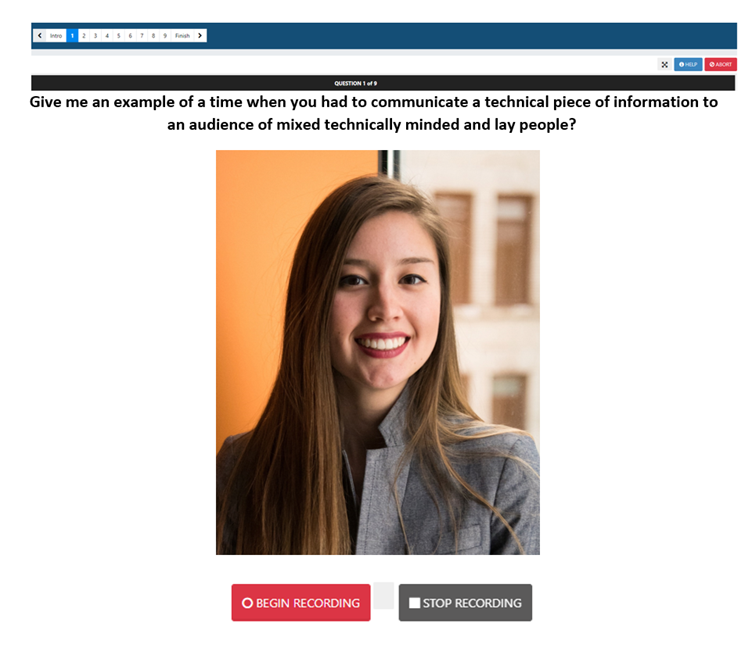


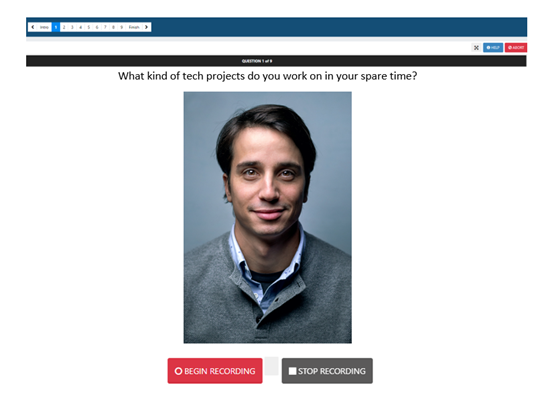
There is no right or wrong solution for questions in a video interview, candidates must answer based on their research on an employer and past experiences.
The pre-recorded video interviews we offer each contain 9 questions. Candidates typically have two minutes to answer each automated interview question. However, the amount of time assigned per question is entirely customisable.
Let’s now move onto the differences between video interviewing technology and commonly used video recording platforms.
Pre-recorded and live video interviews conducted through a video interviewing platform, versus interviews conducted through Zoom or Microsoft Teams, are two different approaches to virtual interviewing. While both have their benefits, interviewing using a video interviewing platform (whether live or pre-recorded) offers several advantages over video interviews conducted over Zoom/Teams.
Below are some reasons why a video interviewing platform can benefit your company, rather than using Zoom and Microsoft Teams:
One such example of back-end data is the use of artificial intelligence to support hiring decisions.
Artificial intelligence (AI) is revolutionizing the video interview process by automating tasks such as candidate scoring, facial recognition, and voice recognition. AI is the use of machines to perform tasks that typically require human intelligence, such as visual perception, speech recognition, decision-making, and language translation.
Major companies such as Hilton, HSBC and Unilever have used AI interview software. This allows companies to interview large numbers of potential candidates even more efficiently than they otherwise could. AI-enabled hiring software can quickly scan interviews with hundreds of applicants.
The importance of AI lies in its ability to analyze vast amounts of data in real-time, identify patterns and insights that are invisible to the human eye, and make predictions based on that analysis. This enables HR professionals to do the following more efficiently:
The incorporation of artificial intelligence into HR procedures is a fresh and most likely irreversible movement. When it comes to hiring, as many as 86% of employers use technology-facilitated job interviews, with an increasing number of them opting for automated video interviews (AVIs)
AI technology can be used to enhance the video interview process in several ways. For example, facial recognition software can analyze a candidate’s facial expressions, tone of voice, and body language to determine their level of confidence, enthusiasm, and engagement. This helps recruiters evaluate a candidate’s soft skills, such as communication, emotional intelligence, and cultural fit, which are difficult to assess through a resume or phone screen.
However, there are ethical and legal considerations to keep in mind when using AI technology to assess candidates. Recruiters should check that the algorithms used are free from bias and discrimination and that candidates are treated fairly and with respect. It is also important to provide candidates with transparency and an opportunity to opt-out of the process and toggle off AI if they have concerns about the use of AI technology.
We will now cover why you should use Assess Candidates for video interviews to recruit.
Assess Candidates video interviews are an effective tool for streamlining the hiring process and identifying the most qualified candidates.
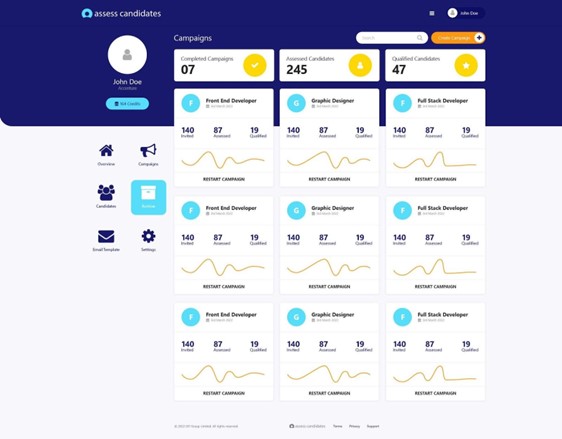
Here are four reasons why you should consider using Assess Candidates video interviews in your hiring process:
Assess Candidates video interviews ultimately provide a modern, user-friendly, and scalable solution to streamline the hiring process and ensure a more accurate assessment of candidate qualifications, skills, and fit. Here is an example case study of how Assess Candidates video interviews have been used previously.
IT consulting company Implements Assess Candidates Video Interview Platform to Streamline Recruitment Process
The HR team at the IT consulting company needed to find a more efficient and effective way to assess candidates while maintaining the quality of hire. They required a solution that would help them identify the best candidates quickly and efficiently, without sacrificing the personal touch of the hiring process. Traditional recruitment methods were time-consuming and often failed to deliver the quality of hire they needed.
After conducting extensive research on modern recruitment techniques, the HR team decided to implement the Assess Candidates Video Interview Platform. The platform provided the team with a digital solution to assess candidates‘ technical skills, communication skills, and overall fit for the role.
The Assess Candidates Video Interview Platform allowed candidates to complete an automated video interview, answering pre-set technical questions worked on by the company and one of our experts. The HR team could then evaluate each candidate’s responses at their convenience, without the need for time-consuming in-person interviews. The platform also provided AI feedback on the candidates performance, allowing the team to make data-driven hiring decisions.
The Assess Candidates Video Interview Platform proved to be an excellent solution. It helped the HR team identify the best technical candidates quickly and efficiently, without sacrificing the quality of hire. The platform reduced time-to-hire, enabling the company to fill open technical positions promptly. Additionally, the platform provided valuable insights into candidate performance, enabling the HR team to make informed hiring decisions. As a result, the IT consulting company was able to build a high-performing technical team that was essential for achieving their growth objectives. Candidate feedback on user experience was overwhelmingly positive: Ease of use, elimination of stress and an interactive and visually enhanced solution that worked for hiring managers and job candidates alike.
Having the right talent matched to the right position is one of the top 3 priorities of the CEO role. It is just as important as ensuring the growing and satisfied customer base and having a sound financial position to continue developing the business.
Simply put, no CEO can afford hiring employees who will not be a good fit for the company – making and hence recruitment is such an important function of any business, large or small.
As a talent acquisition expert, hiring manager or HR professional, you play a pivotal role in recruiting the right talent who possess the skills of the future or potential to develop them. This is where pre-employment psychometric tests come in to help select and recruit the best fit talent for your organisation. The psychometric recruitment tests help make more informed hiring decisions, resulting in improved job performance, better employee retention rates, time and cost savings, and ultimately satisfying your line managers.
This article on pre-employment, recruitment psychometric tests, highlights their benefits, optimal use, and how to successfully integrate pre-employment assessments into your recruitment process.
A recruitment pre-employment psychometric test, is a standardised assessment tool that allows employers to assess and appraise the potential, talent, and ability levels of candidates during the recruitment process, as well as their capacity for success in the workplace.
Psychometric tests measure a candidate’s:
among other factors.
Psychometric tests have been used for over 100 years in the candidate selection process and they have solid, proven scientific support.
As a recruiter or hiring manager, psychometric tests provide a valuable means of evaluating a candidate’s suitability for the role in question. By using a personality test and testing candidates’ problem-solving skills, ability to handle challenges they will face in the role, you can make more informed decisions about which candidates are best fit for the job.

In today’s highly competitive job market, it’s more important than ever for organisations to attract and retain top talent.
Psychometric tests provide comprehensive evaluation of a candidate’s mental capabilities and behavioural traits. These assessments are a valuable resource for employers looking to make data-driven, legally defensible, and effective hiring decisions. By measuring factors such as personality, cognitive abilities, and work style, psychometric tests provide objective data that can help determine a candidate’s suitability for a specific job role and the organisation’s culture.
These tests are relevant for all job levels, from entry-level to senior positions. Ultimately, psychometric tests provide a reliable and scientifically validated method of assessing candidates, leading to more successful hires and a stronger workforce.
Aptitude tests are a type of psychometric test that assess a candidate’s skills and abilities in specific areas such as numerical, verbal, or logical reasoning. They are often used to determine a candidate’s suitability for a certain role, particularly for roles that require technical or analytical skills, such as IT, finance, or engineering. By using psychometric tests, the risk of hiring someone who lacks the technical skills required for the job is reduced, leading to better overall job performance and productivity.
In fact, research has shown that nearly all large businesses and 70% of SMEs in Europe, India, and Australia use aptitude tests, indicating a significant rise in the use of these tests over the past 8 years.
Top reasons to consider when using psychometric tests during your recruitment process:
It is also important to consider how psychometric tests can be applied in different types of recruitment efforts. Understanding which form of recruitment your organisation is undertaking can help you determine how psychometric tests can best be utilised in the hiring process.
Broadly speaking, we may divide recruitment efforts into the following 4 forms:
| High Volume Recruitment | A large number of applications need to be reviewed |
| Medium Volume Recruitment | A moderate number of applications need to be reviewed |
| Low Volume Recruitment | A small number of applications will be reviewed, such as for senior hires |
| Rolling Recruitment | A continuous hiring process where an organisation accepts job applications whilst leaving the role/job advert open. |
Regardless of the type of recruitment, pre-employment psychometric tests can help to reduce time-to-hire and accurately assess candidates.
When it comes to assessing candidates, recruiters have a range of psychometric tests at their disposal to determine if a candidate has the right skill sets for the role. Here are the most common types of psychometric tests used in recruitment:
To Assess Candidates effectively, it’s important to tailor the selection of tests to your organisation’s needs. Our team of organisational psychologists and consultants can work with you to develop a bespoke candidate assessment process that aligns with your recruitment goals and objectives.
Psychometric tests are often used alongside other selection methods, such as video or face-to-face interviews, assessment centres and references, to provide a more comprehensive understanding of a candidate’s abilities and suitability for a role. This helps recruiters make more informed hiring decisions and reduces the risk of costly hiring mistakes. The tests can also provide valuable insights into a candidate’s strengths and weaknesses, which can be used during the interview process and for ongoing development and training once a candidate is hired.
Aptitude tests are commonly used to filter out unsuitable candidates early in the process, and further psychometric testing can be used to evaluate a candidate’s personality traits, values, and motivations. Different types of jobs may require different types of psychometric tests, such as numerical reasoning tests for roles that require analytical skills and behavioural tests for roles that require interpersonal skills and teamwork.
Here is an example of a typical recruitment process:

The goal of psychometric testing is to efficiently screen out unsuitable candidates, without the need for time-consuming one-to-one interviews and focus recruiters’ attention on candidates who are more likely to be a good fit for the role.
The table below presents a summary of an assessment centre and the different types of psychometric recruitment tests, and their potential applications:
| Test Type | Description | Potential Roles |
|---|---|---|
| Aptitude | Assess cognitive abilities such as numeracy, literacy and spatial awareness | Roles that require strong analytical and problem-solving skills |
| Behavioural | Assess personality traits, values, and motivations | Roles that require strong interpersonal skills and teamwork |
| Assessment Centres | Evaluate a candidate’s abilities and potential through various exercises such as group activities, role-plays, and presentations | Roles with potential for leadership positions |
| Game-Based Assessments | Use interactive tasks and game-like elements to evaluate a candidate’s cognitive abilities and personality traits | Roles that require creativity and adaptability |
Note that this table is just an example, and recruiters should consider the specific needs of their company and roles when deciding which types of tests to use.
This question is a great starting place for any recruiter or HR professional who is looking to plan or design a recruitment campaign for their team or department. In the following steps we explain each key decision point you will need to carefully consider to prepare a sound recruitment strategy plan.
Determining the size of your recruitment campaign can be difficult, however there are some easy tricks you can follow. Here are two important factors to consider:
Things to keep in mind:
Each organisation, and sometimes even individual departments within an organisation will have their own approach to involving recruiting teams in the selection process of their future co-workers.
It is best practice for recruiters and HR specialists to organise the recruitment process in a way that minimises any distractions to the daily running of the business, as well as ensuring each candidate has an equal and fair chance for evaluation. What does this mean for your company?
Understanding what is needed from a potential employee is crucial to achieving the right result. How do I prepare a job specification and candidate profile?
This depends on whether you are filling a longstanding position or a new role in the company or industry. If it is a well-established position, such as a financial analyst, you can find the requirements online or on job boards of your competitors. However if it is a new role, such as a creative director, you will need to work closely with the sponsor of the recruitment campaign to understand their objectives and the expectations and challenges of the position.
For example. If you’re looking for a junior data scientist with experience in the pharmaceutical industry, any candidate with experience in this field would be a bonus. However, attention to detail and introverted personality traits may be more important for success in a role that requires meticulous analysis of product and sales in a highly sensitive and regulated environment.
Would you prefer to employ someone without experience in this field but with the right skills and personality profile? Or someone with experience but without the necessary skills and personality traits? The former may require additional training but will make a valuable and long term contribution to the company, while the latter may not require training but may lack the motivation and determination to perform the job’s required tasks, leading to high turnover and costs of the company.
Once you have built a candidate profile, match each element against an assessment tool.
(Link the assessments sections here).
At Assess Candidates we provide personalised service in preparing the assessment matrix. We will help you break down key candidate requirements and match these against a variety of assessments so that you can ensure your recruitment approach is sufficient and reliable. We will explain major differences and benefits and risks of choosing between alternative options.
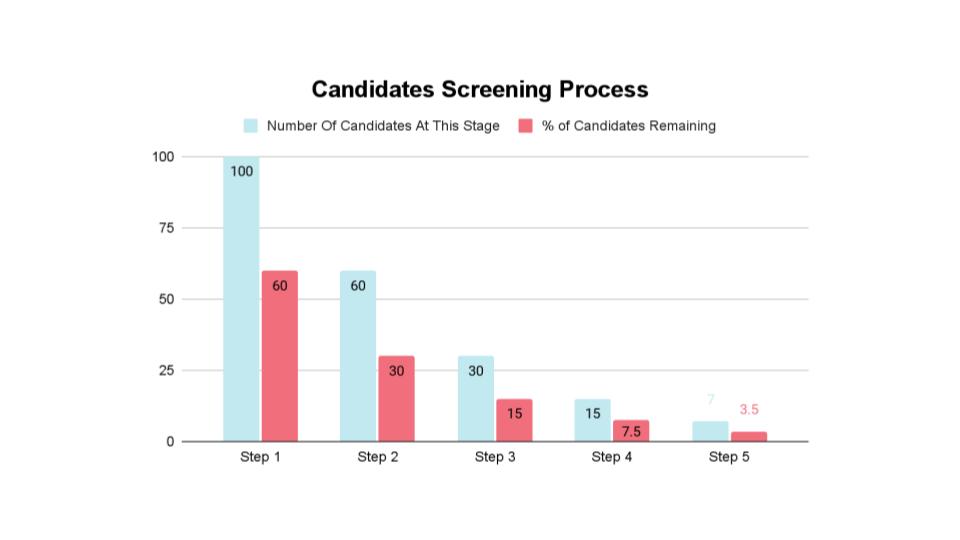
There are many different methods and techniques you can use to interact with your candidates during the recruitment process, which includes the type of communication (invitations, instructions, feedback messages) and type of assessments (standard or interactive, live or pre-recorded, etc.). Each decision will highlight the motivations and culture of your company.
Recruitment campaigns have become a new marketing and brand building tool.
This is an opportunity to define the brand experience you want to convey to potential employees. For Example if your company works with new technologies and wants to attract tech-savvy Gen Z candidates, your messaging should reflect that. Alternatively, if your company works with traditional clients, like in the insurance industry, trust, simplicity and familiarity may be the most important branding message.
Consider how automated you want your recruitment process to be. Nowadays, job matching tools can analyse CVs to help you structure a decision-making algorithm that selects the best candidates. Equally, video interviews can be conducted in an automated manner, but if your company values physical interaction among coworkers, your teams may want to personally screen each candidate at this stage.
As your candidates pass a series of assessment tests, such as aptitude reasoning tests, are you looking to eliminate candidates based on each of the series of tests, or would you prefer to analyse the aggregate outputs?
Prepare the budget for the recruitment transformation or new assessment tools but remember to estimate not only future spending but also expected savings.
The decision makers and recruitment campaign sponsors will expect you to provide a sound financial analysis for any proposal. This includes your plans to change your company’s recruitment strategy or selection of assessment tools. What do you need to consider to prepare an effective recruitment budget?
What forms part of the total cost?
The nature of realised saving opportunities and benefits are harder to estimate – there are many dynamic factors in making your recruitment campaign successful. However, it is imperative that you try to quantify:
These include higher staff productivity and stronger market position stemming from effective recruitment, as well as fewer unsuccessful staffing choices (fewer employees leaving their jobs before being able to generate value for the business). Our research at Assess Candidates estimates that the cost of new assessments is usually paid back within the first year of implementation.
Assessing the number of individuals involved in a recruitment campaign and the extent to which their time was diverted away from their main responsibilities is an important step in evaluating the efficiency of the internal recruitment efforts. Here are some potential considerations to keep in mind:
Many companies – especially small and medium sized enterprises struggle to perform successful recruitment campaigns simply because they lack the size and budgets to organise it internally. The same companies are very successful and effective in what they do best – their respective business offerings in their markets. Why not focus on what generates most value and not leave the recruitment job to the experts?
At Assess Candidates we want to support organisations of all sizes.
Here are some pros of why psychometric tests should be used during the hiring process:
Despite the numerous benefits of using psychometric testing in recruitment, there are some drawbacks to consider. Here are three potential disadvantages and solutions:
Solution : Combine assessments with other selection methods such as interviews or references to gain a more comprehensive understanding of the candidate’s skills and experience.
Solution : Check what anti-cheating software is integrated into the solution offered by your provider. You can also utilise technology such as video interviews with AI facial recognition and live recording, which makes cheating impossible. Or re-test randomised candidates at a later stage.
Solution : Discuss the practice resources providers can offer to alleviate test anxiety. Have a user-friendly interface that candidates can easily navigate. Ensure the technology infrastructure is reliable and functions smoothly to avoid candidates experiencing technical difficulties, which can add unnecessary stress.
At Assess Candidates we provide a range of psychometric assessments to suit all organisation’s needs.
Below is an example of our reporting tool on Assess Candidates, that you as a hiring manager or talent acquisition expert will see when reviewing candidate performance.
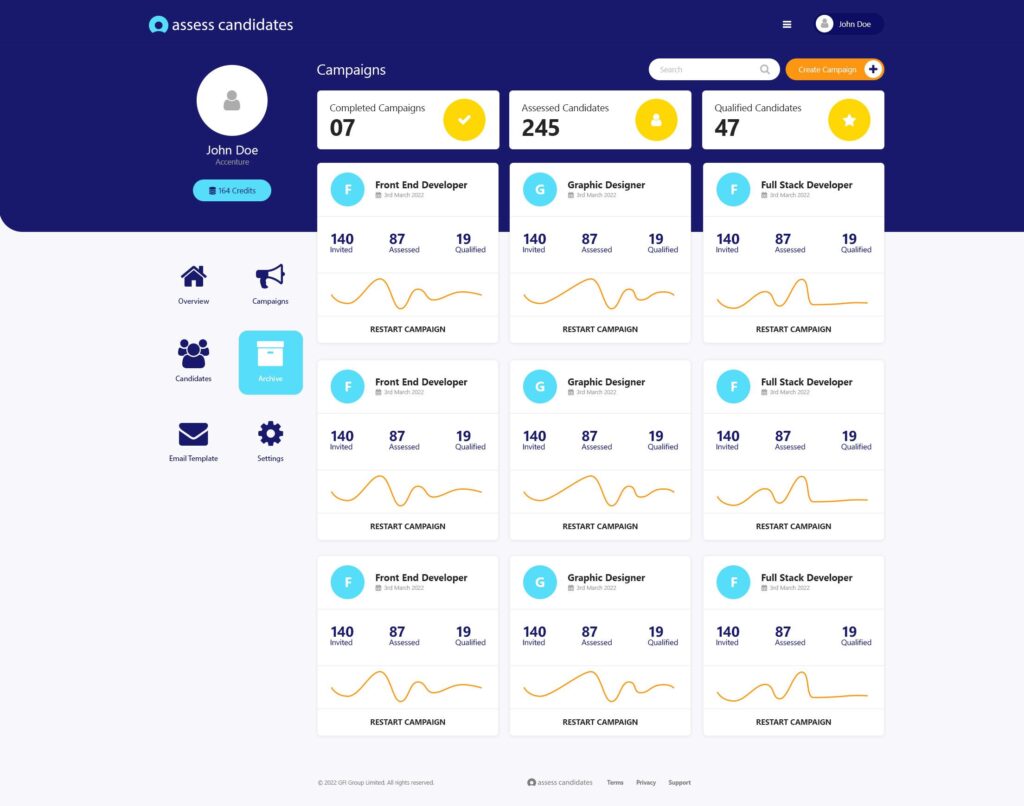
Here are the top four reasons to consider using Assess Candidates’ Psychometric tests for your hiring process:
A leading FMCG company approached us for a proposal for a transformation of their recruitment process among the challenges in retaining top talent and high employee turnover. We worked together with client’s stakeholders to identify the inefficiencies in the process, reasons for short staff tenure and problems with job matching.
With the new recruitment strategy, as well as Assess Candidates hiring assessment platform, our client was able to:
When we performed a post campaign impact analysis with the client we found that the use of psychometric assessments saved the company money in terms of recruitment costs, improved overall employee satisfaction, and boosted morale.
A medium-sized company approached us with their challenge of attracting top talent whilst competing against larger companies with bigger budgets and long standing known brands. Together with the client’s HR team we identified a better way to evaluate candidates beyond just their experience and qualifications. We recommended:
With the use of our hiring assessment platform, the client team was able to invite a larger than usual number of candidates in the process without sacrificing on the quality of job matching. Our assessments helped identify candidates who were a good fit for the company’s culture and values, resulting in a higher percentage of new hires who stayed with the company for longer periods. The assessments were found to be user-friendly and highly predictive of job performance, allowing the HR team to confidently make hiring decisions.
As a result, in the long term our client was able to run effective and successful recruitment campaigns, attracting better talent at a lower price and with fewer system and process inefficiencies. Our client grew the personnel within a few recruitment campaigns and was able to successfully strengthen their position in the market.
Psychometric tests are used across a wide range of industries and roles – with industries such as finance, consulting, law, engineering and IT leading the way in the use se psychometric for their recruitment campaigns The types of tests that are most common and recognisable in recruitment are: cognitive ability tests (also known as aptitude tests), personality tests, and situational judgement tests.
In finance and consulting, for example, cognitive ability tests are commonly used to assess a candidate’s numerical and verbal reasoning abilities, while in engineering and IT, technical aptitude tests may be used to assess a candidate’s problem-solving and understanding complex systems. Personality tests may be used across industries to assess traits such as openness to experience, conscientiousness, and emotional stability, while situational judgement tests may be used to assess a candidate’s decision-making abilities.
| Industry | Recommended Assessments | Key/most common Assessments |
|---|---|---|
| Banking | Aptitude tests, Presentation, Negotiation and Team exercise, Video Interview – competency and personality, Game-based assessments. | Numerical reasoning test, Assessment centre exercises that involve other candidates, Case study interview |
| Consulting | Aptitude tests, Game-based assessments, Situational Judgement Test, Assessment centre exercises and Personality interviews. | Numerical and logical reasoning tests, Personality and Situational Judgement tests, Risk and attention measuring games |
| Law | Aptitude and Personality tests, Video interviews | Checking tests, Critical thinking tests, Case study interviews and Verbal reasoning tests. |
| Technology | Technical tests (mechanical, coding, AI), Numerical and Logical reasoning, Game-based assessments and Technical interviews. | Technical tests (mechanical, coding, AI), Aptitude reasoning tests and technical interviews. |
Psychometric tests have key advantages in the recruitment process:
In conclusion, by using psychometric tests, companies can help to reduce the impact of unconscious bias and ensure that candidates are evaluated based on their abilities rather than their background. This can help to increase diversity in the workplace and ensure that the best candidates are selected for the role.
Psychometric tests are designed to measure a candidate’s abilities in comparison to a norm group, which is typically a group of people who have previously taken the test. To determine whether a candidate has “passed” a test, a threshold or passing percentile is often set. This threshold or percentile represents the minimum score a candidate must achieve to be considered for the role.
For example, if the passing percentile is set at 50%, it means that a candidate must score higher than 50% of the norm group in order to be considered for the role. Percentile refers to the percentage of the entire population that the candidate performed better than – eg. if passing percentile is set at 70%, only 30% of the best performing candidates progress to the next stage.
What will the passing percentile depend on:
Psychometric testing can be a valuable sifting tool when there are a large number of candidates applying for a particular role. By setting a passing percentile, recruiters can use the results of the test to quickly identify candidates who are most likely to be a good fit for the job.
A valuable skill that sets candidates apart and is crucial for the job may require a higher passing score than other skills. For instance, an IT job may require a candidate to score above the 50th percentile on a verbal reasoning test, indicating they perform better than half of the test pool. However, for a numerical reasoning test or coding assessment, the required percentile may be as high as 80%. This ensures that the candidate possesses the necessary proficiency in these skills that are particularly relevant to the job.
Some industries are more challenging to get into – examples of aptitude tests in investment banks and on the other side Big 4 firms that include more ‘interactive’ problem solving assessments, and divert away from focusing on numerical or verbal scores. There are many possible strategies. Some industries pose more challenges to applicants than others.
There are various approaches to tackling these tests and succeeding in these competitive industries.
Technology has transformed hiring, empowering recruiters with powerful tools to find top talent. Applying for jobs is now easier than ever, thanks to ‘easy apply’ or ‘one-click apply’ features.
However, this advancement also presents a significant problem to the talent acquisition department. As a hiring manager or HR professional, finding the best candidate among the pool of job applications is daunting, often like finding a needle in a haystack.
To avoid this issue companies use standardized assessments, such as aptitude tests, to identify the best fit for the job. These tests evaluate a candidate’s potential for success in a specific role.
With the right blend of technology and strategies, you can uncover the perfect candidate from the applicant pool.
This article highlights the transformative benefits of pre-employment aptitude assessments, showing you how they can make your hiring process a breeze.
Keep reading to find out more.
An aptitude test is a standardized assessment to assess the cognitive skills and potential of candidates. By utilizing an aptitude test, employers can evaluate a candidate’s abilities and make informed decisions when selecting the most suitable applicants for the role.
A pre-employment aptitude test measures the ability of candidates to learn and perform required tasks to be successful in the specific work environment of your organisation. Although these assessments do not necessarily measure innate intelligence, they provide insight into whether a candidate has the necessary abilities to succeed in a given role.
Having explored the concept of aptitude tests in recruitment, we now turn our attention to their significance in the hiring process. Understanding why aptitude tests hold such importance is crucial in grasping their impact on effective candidate evaluation and selection.
Let’s now look into the key reasons why aptitude assessments are crucial in the recruitment process
Assess using our science-backed aptitude tests for your next project. Hire For Free
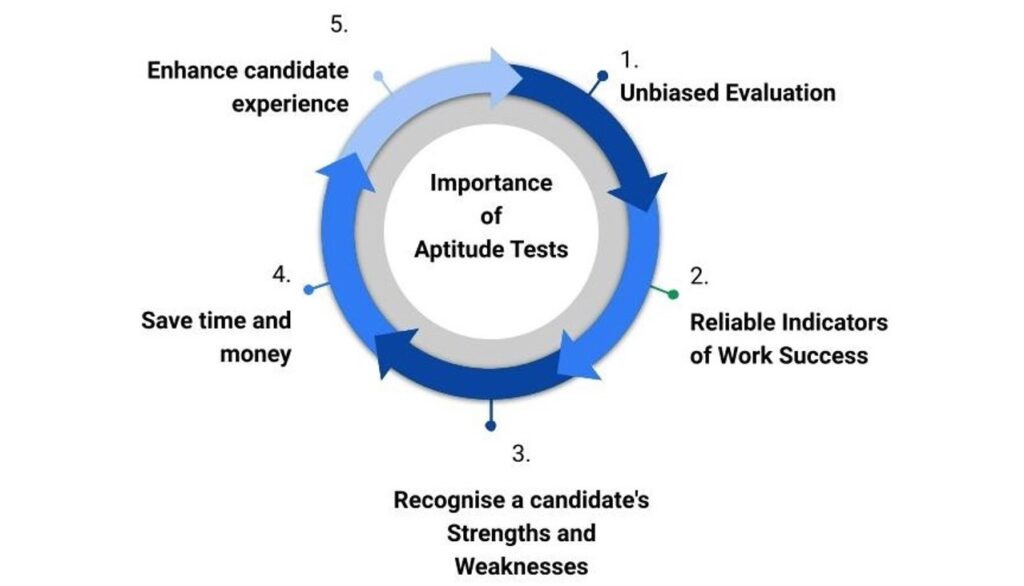
Good to know: Having an engaging assessment platform can be a quick win to help build a favourable brand impression among your candidates.
Now that we understand the importance of aptitude tests in recruitment, let’s delve into the pros and cons of implementing them. By considering the benefits and challenges, we can gain valuable insights to enhance our hiring practices.
Let’s explore the advantages and potential drawbacks of aptitude tests in recruitment.
| Advantage of using pre-employment aptitude test | How it impacts the hiring process |
|---|---|
| Cost effective | Aptitude tests for recruitment can help find the most eligible applicants for a job, reducing the need for additional recruitment efforts and saving on advertising and candidate screening costs. |
| Unbiased | Pre-employment aptitude tests are given consistently to all applicants, guaranteeing that everyone is assessed using the same criteria. This serves to reduce differences in the recruitment procedure and reduces the possibility of bias. |
| Boost organizational diversity | Aptitude tests can be taken from anywhere allowing people from all over the world to be assessed, thus boosting potential for diversity across your organization. |
| Efficient recruitment tool | Aptitude assessments can be given swiftly and effectively, saving the HR department’s time spent interviewing and screening applicants. |
| Scientific validity | Aptitude assessments are designed based on research and psychometric principles to ensure that they accurately measure the abilities and skills that are relevant to the job. |
Good to know: According to Sartori and Pasini, 2007, the objective of an aptitude test is to assess an applicant’s ability by scoring the speed and accuracy of their answers. Using these scores, the aptitude tests allow the employer to make a more informed hiring decision based on the candidate’s performance.
As we have explored the benefits of implementing aptitude tests in recruitment, it is important to acknowledge that like any assessment method, there are also potential challenges to consider. Now, let’s delve into the disadvantages of implementing aptitude tests, ensuring a comprehensive understanding of the subject and enabling you to make informed decisions for your recruitment process.
| CONS | How it Impacts the Hiring Process |
|---|---|
| Test anxiety | Test Anxiety is a frequent challenge that applicants face while taking an aptitude assessment. It can impact candidate performance, preventing them from displaying their true ability. It can be avoided by offering them practice tests and tools, as well as straightforward instructions, support, and encouragement throughout the testing process. |
| Cheating | Cheating on aptitude tests is possible, especially if they are given remotely, which can weaken the accuracy of the results. Opt for a provider with tools to minimise cheating and strict time conditions where cheating is less impactful. |
| Captures one aspect of a candidate’s performance | Aptitude tests for recruitment do not assess a candidate’s psychological characteristics, work experience, motivation, or interpersonal skills, all of which can influence job success. An applicant may score well on an aptitude test but lack the required skills or expertise to perform well in the interview. It is important to use a range of assessments to ensure softer skills are captured to build an overall picture. |
| Time is required to design the aptitude test | The design of an aptitude test can take time and needs plenty of detail to get just right. Solve this by turning to an external provider as opted for by many organisations. |
| Not suitable for all roles | Pre-employment aptitude assessments are unlikely to be suitable for all roles. It is key to consider the nature of your role and request consultation from a trusted advisor to build your perfect assessment process. |
Having examined the pros and cons of implementing aptitude tests for job recruitment, it is crucial to explore how these tests are scored and understand the concept of percentiles. By delving into the scoring process we can gain a deeper understanding of how aptitude tests are evaluated and how they can effectively inform hiring decisions.
Let’s now explore the scoring methods and passing percentiles associated with aptitude tests in recruitment.
Since recruiters are in charge of administering the aptitude test, they can set a benchmark score or passing percentiles required for the candidates.
For example, a company may establish a passing percentile of 70%, indicating that individuals scoring at or above the 70% mark would be considered for future rounds.
You’re probably wondering what criteria you should use to determine a passing percentile.
Here are a few crucial factors that will help you to get more clarity:
We recommend a lower cut-off at the 30th percentile. This helps ensure not too much weight is put on an assessment, as no method is 100% infallible. Rather, you safely sift and progress desired applicants through this method.
Now that we have covered how aptitude tests are scored and the importance of passing percentiles, let’s shift our focus to the ongoing validation and adaptation of these tests in the recruitment process. Exploring this continuous process will help us understand how aptitude tests remain reliable and relevant in assessing candidates over time.
Screen candidates using aptitude tests crafted by experts. View Plans
Ongoing test validation and adaptation are critical to keeping aptitude tests relevant and successful in the recruiting process. Here are some key details to consider:
While aptitude tests undergo ongoing validation and adaptation to ensure relevance, it’s crucial to question their effectiveness compared to traditional interviews. Aptitude tests for recruitment provide objectivity, while interviews are often said to be prone to biases.
Let’s explore the nature of aptitude tests and then weigh their predictive accuracy against traditional interviews.
Traditional interviews have long been the go-to method for evaluating job candidates, but research suggests they may not be the most accurate predictor of job performance.
According to a Harvard Business Review survey, 63% of hiring managers believe traditional interviews fall short in assessing a candidate’s true capabilities. While interviews allow for open conversations and the evaluation of soft skills, they are prone to biases and first impressions, which can cloud judgment.
Aptitude tests, on the other hand, provide a more objective and unbiased evaluation of a candidate’s skills. These exams assess a candidate’s cognitive ability, problem-solving abilities, and other work-related traits, offering insightful information about how well they could function in their future roles.
A study conducted by revealed compelling evidence of the effectiveness of various cognitive ability tests, including aptitude tests, in predicting job performance with a validity coefficient exceeding 51% (Hurtz & Donovan, 2000).
Both aptitude tests and traditional methods of interviewing can be used by a wide range of companies, and the choice between them often depends on various factors, including:
Aptitude tests are highly valued in
Traditional interviews are preferred in:
The approaches a firm chooses to use to evaluate job candidates, traditional interviews or aptitude tests, depends on the requirements and preferences of that particular organization. A hybrid strategy that combines the two approaches can result in a more thorough and accurate review, which will eventually improve recruiting decisions.
Now that we have explored the aptitude tests versus traditional interviews in assessing candidate performance, we will take a look at examples of aptitude tests used in recruitment.
Aptitude tests used in recruitment cover a wide range of cognitive abilities and skill sets. By examining these examples in detail, we can gain a better understanding of the types of aptitude tests utilized to assess candidates’ skills, abilities, and potential.
Here are a few examples of aptitude tests commonly used by employers.
Screen your candidates in minutes. Hire For Free
Let’s explore a range of aptitude tests frequently employed in recruitment in detail and how they contribute to effective candidate evaluation.
The Numerical Reasoning Test assesses the candidate’s ability to perform arithmetic calculations by drawing numerical data from charts, graphs and tables.
An example of a pre-employment numerical reasoning question:

Verbal reasoning assessments measure the candidate’s ability to critically read a passage of text, interpret it and use conclusions drawn from a written passage of text to assert if the statements in question are true, false or Cannot Say.
Here is a glimpse of a pre-employment verbal reasoning test question:

Logical reasoning test examines the candidate’s ability to solve problems, identify the pattern, and reason critically by interacting with visual sequences based on shapes, diagrams and icons.
Check out the pre-employment logical reasoning test question example below:
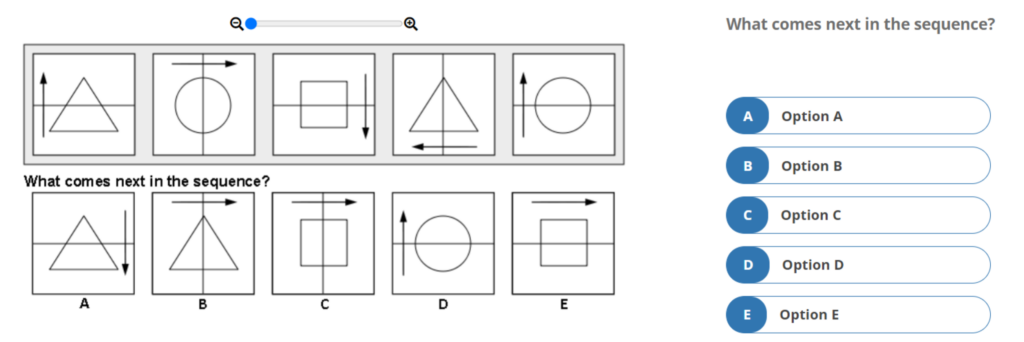
Diagrammatic Reasoning Test requires candidates to use logical reasoning skills to interpret the patterns in a sequence to solve problems. Diagrams, flowcharts, and other visual representations of information are commonly used in diagrammatic reasoning assessment.
Here is an example of a diagrammatic reasoning test

Abstract reasoning tests use abstract shapes and symbols. It is used to assess a candidate’s ability to recognise patterns and relationships in complex sets of data without the assistance of visual representations.

This assessment measures the candidate’s ability to compare and analyse various 2D and 3D shapes to solve problems.
Spatial reasoning frequently demands the candidate to rotate and manipulate shapes in their head mentally and is used to evaluate abilities including spatial perception, mental visualisation, and spatial memory.

In this assessment, the candidate’s ability to critically reason is measured using a variety of statements and questions around the information provided.
The critical reasoning test is to analyse the capacity of candidates to make judgements and solve problems by applying evidence and reasons.
Critical thinking abilities are regarded as an important talent for assessing decision-making capacity while under pressure.
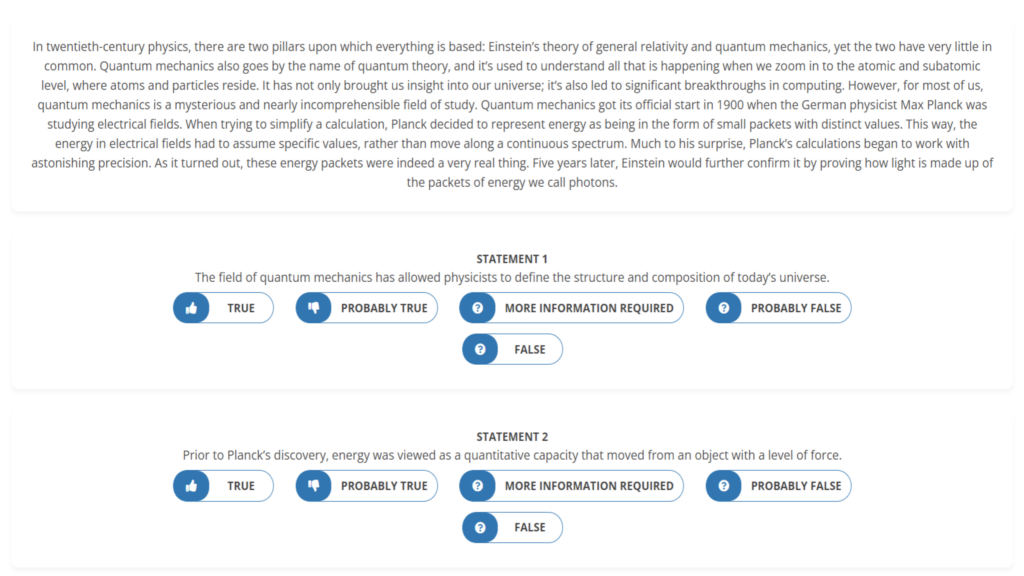
In this assessment, candidates are provided with likely scenarios and will be required to choose the best (and worst) decision options.
A Situational Judgement Test can give significant insight into how a candidate would react in certain work scenarios.
Specific soft skills, like leadership, responsibility, and time management, can potentially be measured through situational judgement assessments.
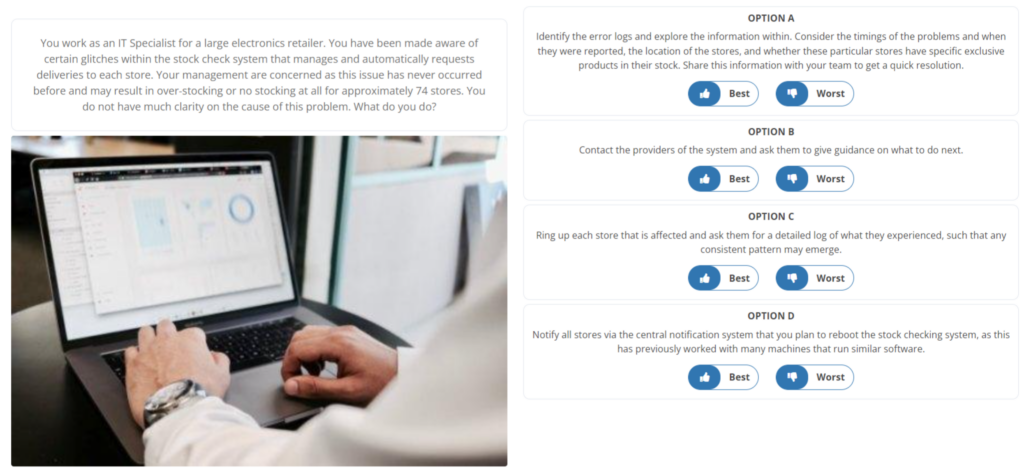
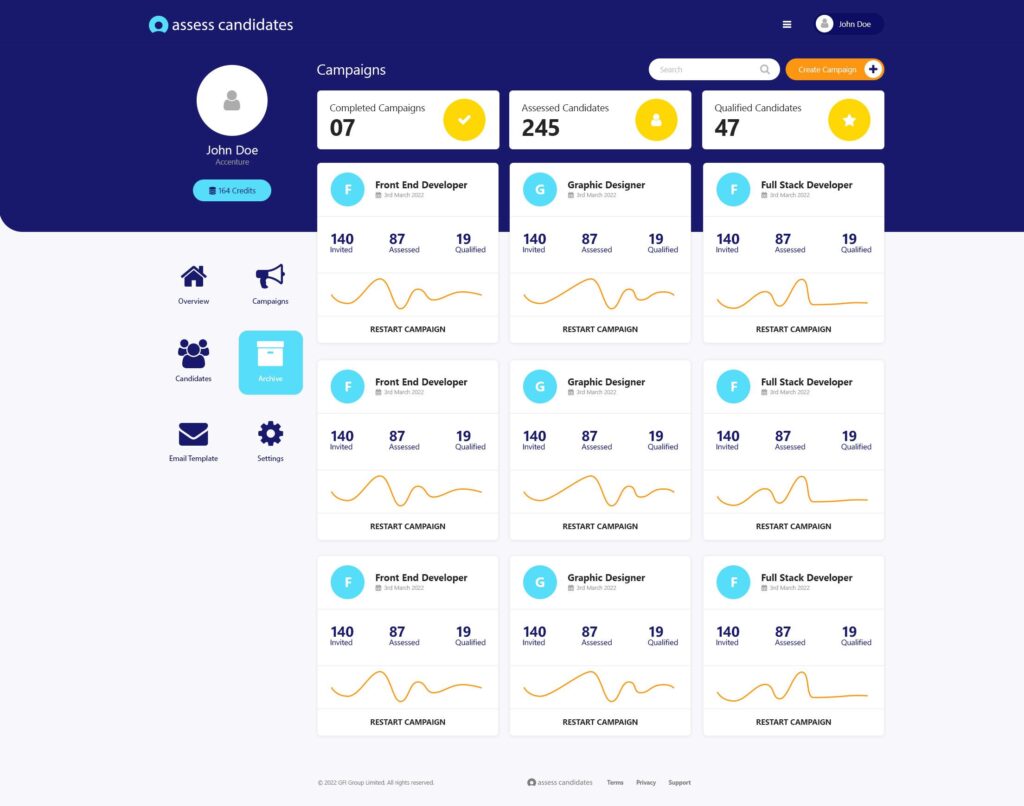
Here are the top four reasons to consider using Assess Candidates’ Aptitude tests for your hiring process:
In conclusion, by incorporating aptitude tests, recruiters can make informed decisions, improve the efficiency of candidate selection, and enhance the overall quality of their workforce. However, it is crucial to regularly validate and verify the effectiveness and accuracy of the tests over time. This ensures that the aptitude tests remain reliable and up-to-date, and continue to provide valuable insights for making hiring decisions.
In the following FAQ section, we will address some final queries that recruiters often have.
This article provides a comprehensive and easily understandable overview of the pre-employment abstract reasoning test, a widely used tool in recruiter’s candidate selection processes.
Are you involved in recruitment as a recruiter, talent acquisition specialist, HR expert, or hiring manager? Chances are, you’re already utilizing a diverse range of candidate assessment tools to swiftly identify and hire the most suitable candidates. These tools can include aptitude tests, video interviews, assessment centers, and even assessment games.
If you are looking for answers to questions such as:
Then this text is for you. Continue reading to find the answers and much more.
A pre-employment abstract reasoning test is a cognitive ability test that assesses a person’s ability to solve problems and comprehend complicated ideas, especially when they have little to no prior knowledge or experience.

Abstract reasoning, also known as inductive or non-verbal reasoning, involves identifying patterns, relationships, and rules within visual or abstract stimuli.
The pre-employment abstract reasoning tests are a common type of aptitude or psychometric test used in job recruitment. They are mainly used to measure candidates’ ability to solve problems and comprehend complicated ideas, especially in situations when they have little to no prior knowledge or experience.
As a recruitment manager or a talent acquisition expert, many jobs you advertise may require strong critical thinking, problem-solving, and analytical skills. These assessments are commonly used in fields such as
Abstract reasoning tests are not designed to assess specific knowledge or skills. Instead, they focus on evaluating an individual’s ability to identify and apply rules or principles based solely on visual stimuli. This prerequisite of abstract reasoning tests highlights the importance of visual-based reasoning in the assessment process.
For recruiters and hiring managers, abstract reasoning tests form a fundamental part of the selection process supporting finding those applicants that have the aptitude to fill the requirements of the role, whether that be in finance, engineering, or scientific research.
Having covered the prerequisites and main competence of abstract reasoning tests, let’s now delve into understanding what these tests measure.
Optimize pre-employment assessments with our speedy automated platform. Simplify and save time. View Plans
Abstract reasoning tests determine a person’s capacity for information analysis, pattern recognition, and making connections without the aid of prior knowledge or specialised abilities.
Abstract reasoning tests provide insights into an individual’s cognitive abilities, including analytical skills, creativity, and critical thinking in abstract and complex situations.

Abstract reasoning tests are a type of cognitive assessment also referred to as inductive reasoning tests because they assess the ability to identify patterns and draw conclusions based on limited information.
Let’s discover the different aspects of abstract, logical and diagrammatic tests.
| Assessment Type | What it measures | What it involves | What is assessed |
|---|---|---|---|
| Abstract Reasoning Test | Abstract pre-employment tests measure a person’s ability to think critically, problem-solving, and make choices based on new or incomplete information. | It typically involves a series of diagrams, shapes, or patterns, and requires the test-taker to identify the underlying logic or pattern that governs the sequence. | The test-taker must then use this understanding to predict the next item in the sequence or complete a missing item. |
| Logical Reasoning Test | Logical pre-employment tests assess an individual’s ability to apply formal or informal logic to solve problems. | These tests often involve questions requiring the test-taker to analyse statements, evaluate arguments, and draw conclusions based on a set of rules or principles. | Logical tests are often used to assess a person’s ability to think logically, critically, and analytically. |
| Diagrammatic Reasoning Test | Diagrammatic pre-employment tests, sometimes referred to as spatial reasoning tests, assess an individual’s ability to understand and manipulate visual information. | These tests often involve diagrams or images that require the test-taker to identify patterns, relationships, and spatial arrangements among objects or shapes. | Diagrammatic tests are often used to assess a person’s ability to understand and work with visual information. |
Although skills in Abstract, Logical, and Diagrammatic Reasoning may overlap, each type has a distinct goal and focus.
Recognizing the distinctions between logical, diagrammatic, and abstract reasoning tests empowers recruiters to assess candidates more effectively, make informed hiring decisions, and optimize their talent acquisition processes.
Let’s now find out about some of the most common types of abstract reasoning tests:
Abstract reasoning tests are intended to assess a person’s capacity for understanding and analysing complicated relationships, patterns, and concepts. There are several types of abstract reasoning tests, including:
It is worth noting that while there are various types of abstract reasoning tests, the terminology used for these tests may vary depending on the publisher or assessment provider.
Gaining a comprehension of these tests will assist the recruiters in determining the most suitable test for your organization and navigating the occasionally unfamiliar realm of psychometrics terminology.
Now, let’s explore some examples of abstract reasoning test questions.
Effortlessly evaluate candidates with our streamlined pre-employment assessments. Hire For Free
To help you visualise the questions, here are some examples of pre-employment abstract reasoning test questions with worked solutions:


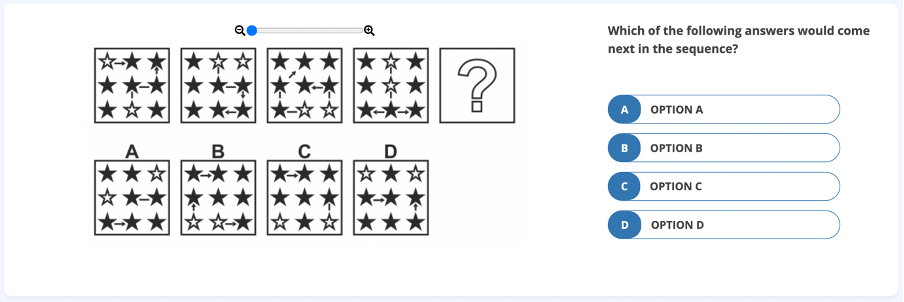
Average time per question: 60 seconds
The abstract test typically contains 10- 40 questions
Learn how to interpret abstract reasoning test results and understand the meaning of percentile score marks with our next section.
By examining the percentile score marks, recruiters analyse the results of the abstract thinking test. A candidate’s performance in relation to other test-takers is depicted by their percentile score, which is a statistical indicator.
For instance, if a candidate has a score in the 75th percentile, it signifies that they outperformed 75% of the test-takers.
Recruiters use percentile scores to compare and identify top-scoring candidates who possess the necessary cognitive abilities for the job. However, it’s important to consider other factors like work experience and soft skills during candidate evaluation.
Here are some general guidelines for interpreting percentile scores on abstract reasoning tests:
Remember: Pre-employment abstract reasoning tests are best used as a sifting tool. We recommend employing low cut offs around the 30th percentile to ensure a basic standard of performance is met. You can then introduce additional stages to find out more about your candidate’s suitability for the role.
Read on to learn more about the advantages of employing abstract reasoning tests for you and your company.
Here are 4 top reasons for incorporating abstract reasoning tests in the hiring process.
For example, a software development company might administer an abstract reasoning test to assess candidates’ logical thinking skills, as they need to solve intricate coding challenges
For instance, an investment firm may use an abstract reasoning test to identify candidates who can quickly understand market trends and make sound investment decisions.
For example, a tech company aiming to enhance diversity and inclusion might rely on abstract reasoning tests to assess candidates solely based on their cognitive abilities.
For example, when hiring entry-level analysts, a consulting company may utilize an abstract reasoning test to eliminate candidates lacking the requisite analytical skills prior to progressing to the interview phase

Despite the valuable insights that abstract reasoning tests bring, there are drawbacks. Let’s cover these in some more detail.
Here are 5 questions often asked when it comes to limitations of abstract reasoning tests in the recruitment process.
Solution: Use abstract reasoning tests alongside a situational judgement test to give candidates a realistic job preview of what to expect in a given role.
Solution: Encourage candidates to practice abstract reasoning tests beforehand to ensure test scores reflect their true performance.
Solution: Consider introducing other assessments to tap into preferences and behavioural competence. For example, a measure of personality or situational judgement test to get a well-rounded picture of a candidate.
Solution: Consider introducing other assessments to tap into preferences and behavioural competence. For example, a measure of personality or situational judgement test to get a well-rounded picture of a candidate.
We will now move onto the industries that employ abstract reasoning tests.
Build an assessment process the way you want. Gain a holistic understanding of your candidate’s suitability for the role. View Plans
Abstract reasoning tests are used in various industries and fields to assess an individual’s logical and analytical thinking abilities.
While specific industries may have their own unique assessment requirements, here are some examples of industries that commonly utilize abstract reasoning tests:
It’s important to note that the specific use of abstract reasoning tests may vary within each industry and even among different companies or organizations.
Now, let’s dive into the roles and positions that are particularly well-suited for recruitment with abstract reasoning tests.
Abstract reasoning tests commonly assess a candidate’s problem-solving and critical-thinking capacity. These tests are most appropriate for highly analytical, creative, and innovative jobs.

Here are some positions that could benefit from the use of abstract reasoning tests in the recruitment process:
| Roles and Positions | Skills Assessed |
|---|---|
| Engineers | Ability to analyse complex data and solve technical problems. |
| Analysts | Ability to understand complex algorithms, think creatively and solve technical problems. |
| Software Developers | Ability to understand complex algorithms, think creatively, and solve technical problems. |
| Architects | Ability to think creatively, analyse complex data, and develop innovative solutions. |
| Scientists | Ability to think critically, analyse data, and solve complex problems. |
Ultimately, any position that requires strong analytical and problem-solving skills could benefit from the use of abstract reasoning tests in the recruitment process.
Keep reading to discover even more answers to frequently asked questions about the Abstract reasoning pre-employment recruitment tests.
Here are a few FAQs that provide recruiters with a better understanding of the rationale, benefits, interpretation, and considerations associated with using abstract reasoning tests in the pre-employment recruitment process.
Try our range of end-to-end hiring assessments. Invite 5 candidates on us. Hire For Free
At Assess Candidates we provide a range of psychometric assessments to suit all organisation’s needs.
Below is an example of our reporting tool on Assess Candidates, that you as a hiring manager or talent acquisition expert will see when reviewing candidate performance.
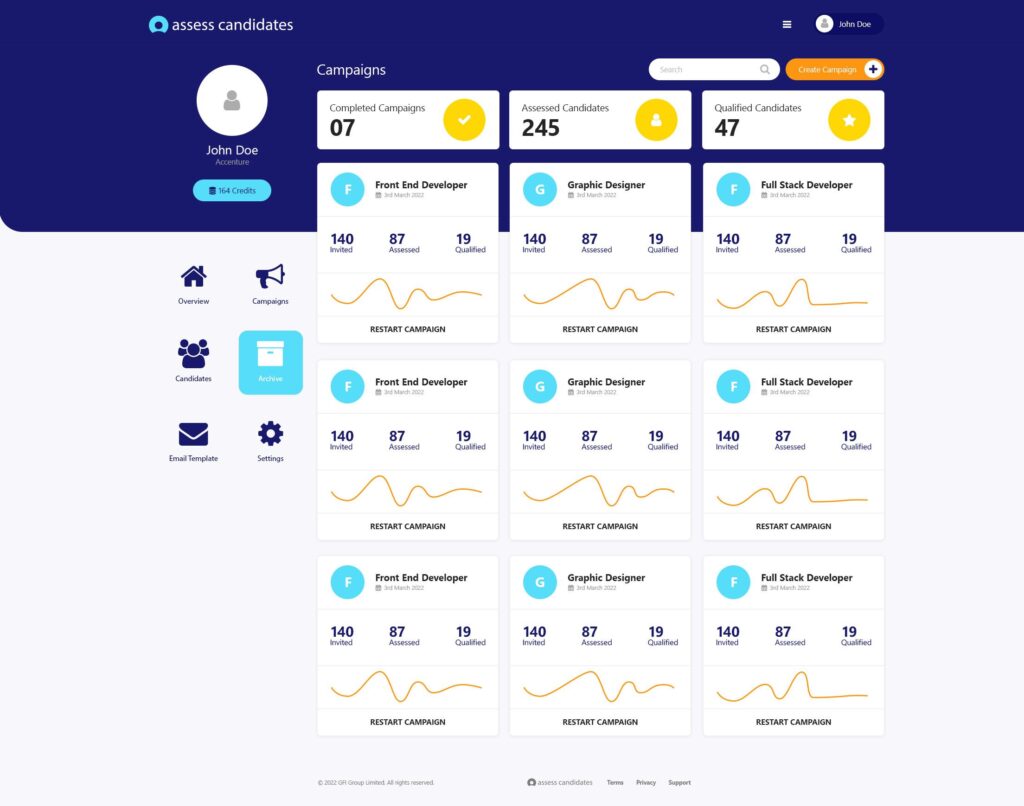
Here are the top four reasons to consider using Assess Candidates’ Pre-employment tests for your hiring process:
Ready to start hiring? Write to us, or try for free and assess candidates in minutes.